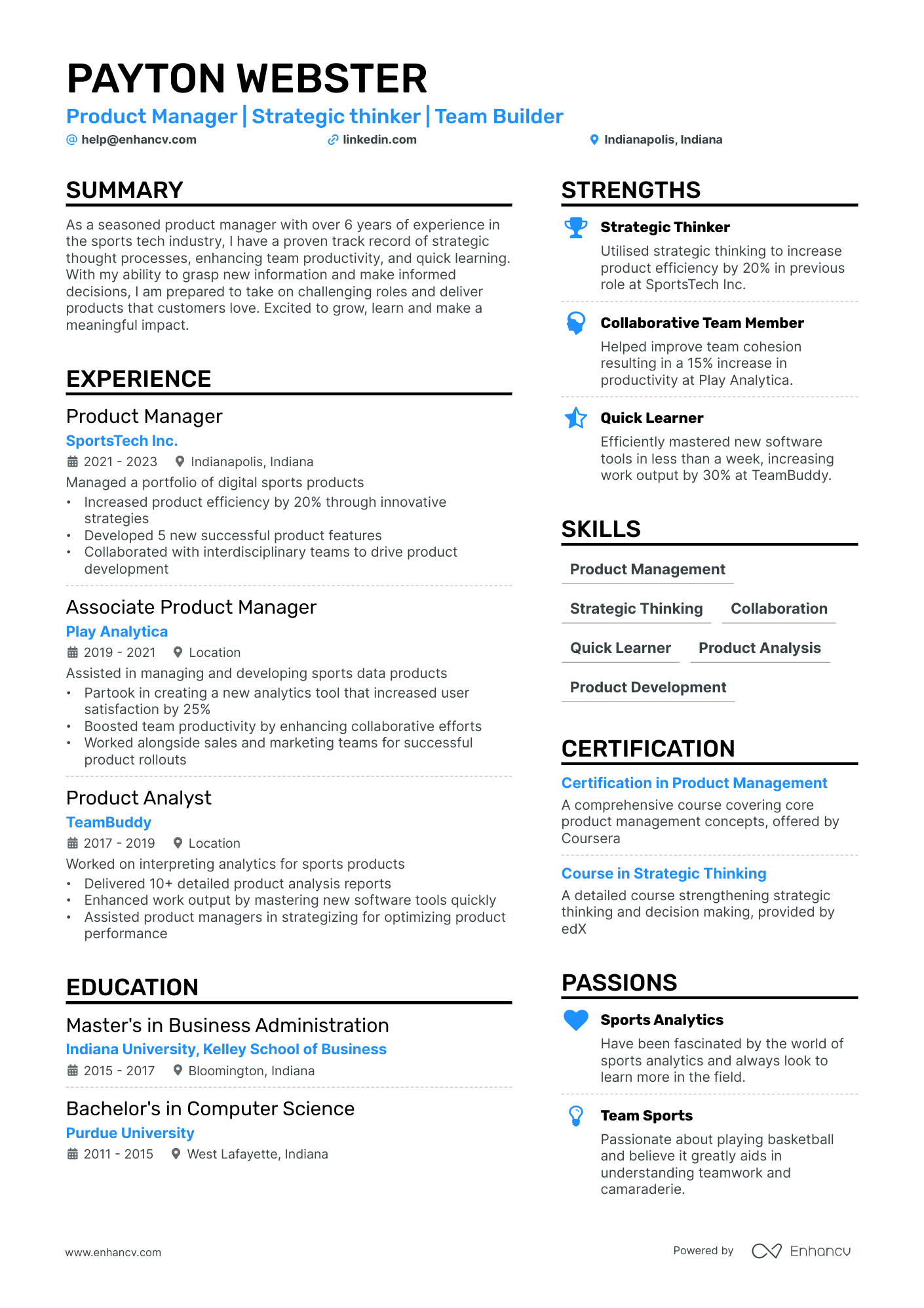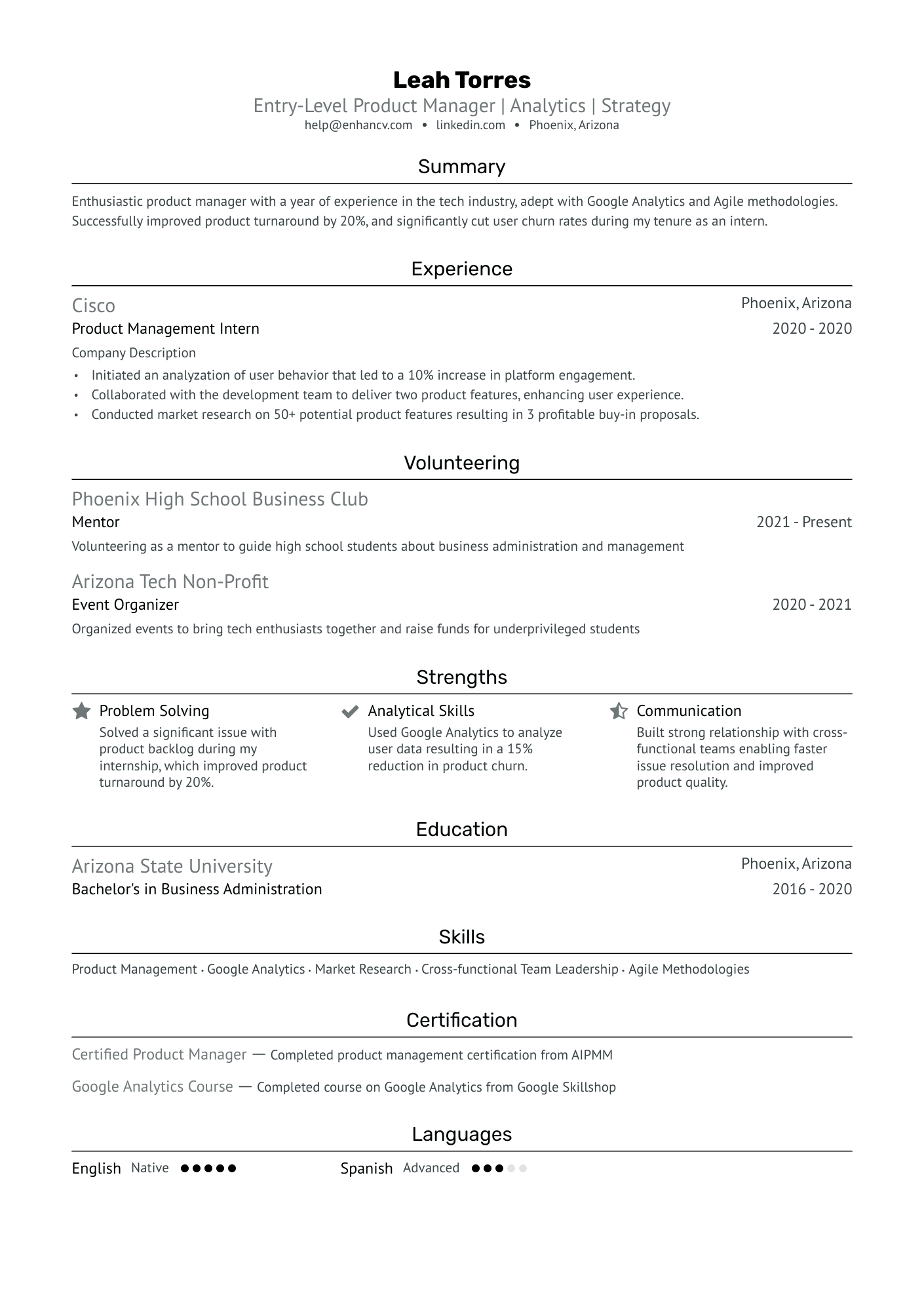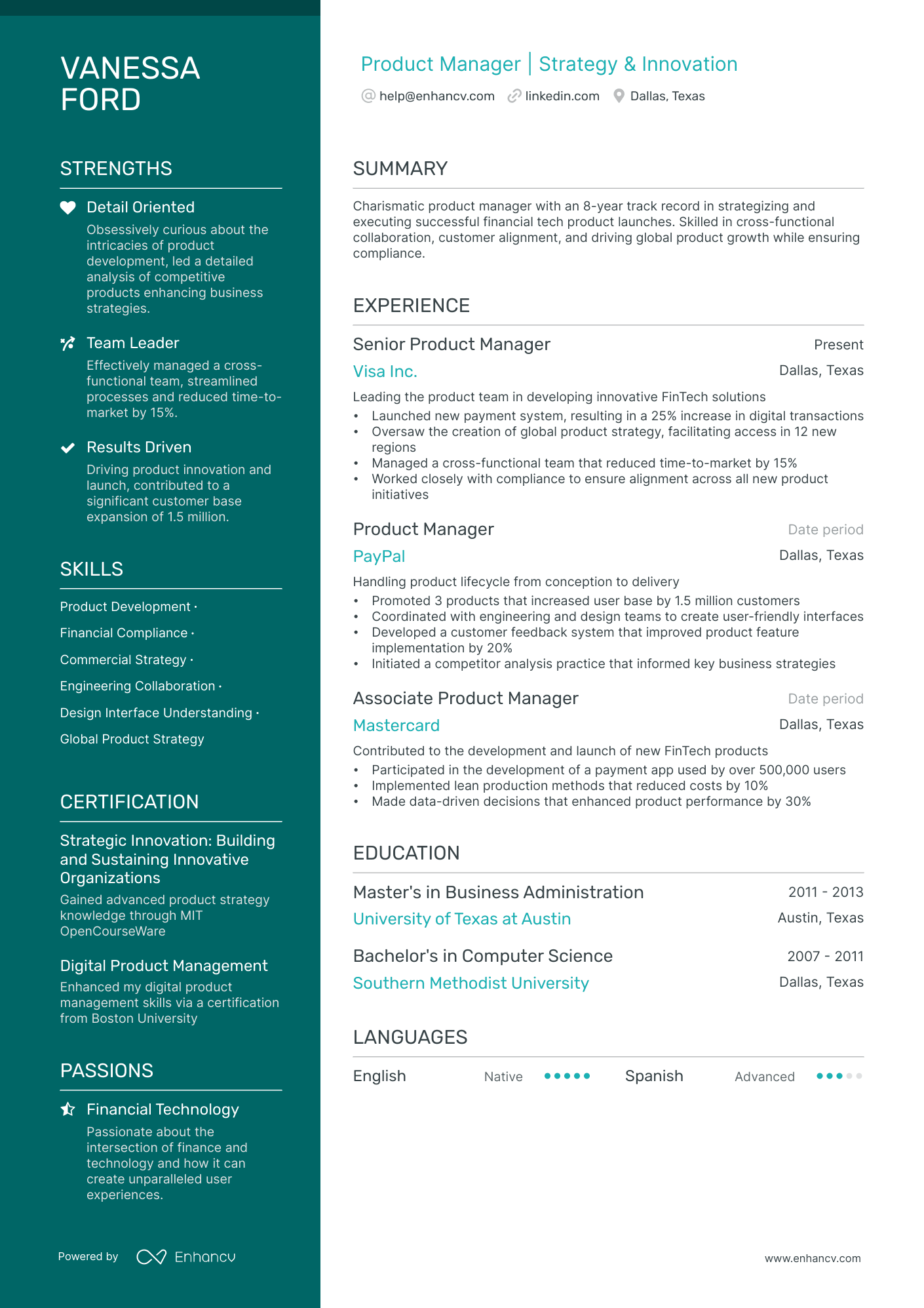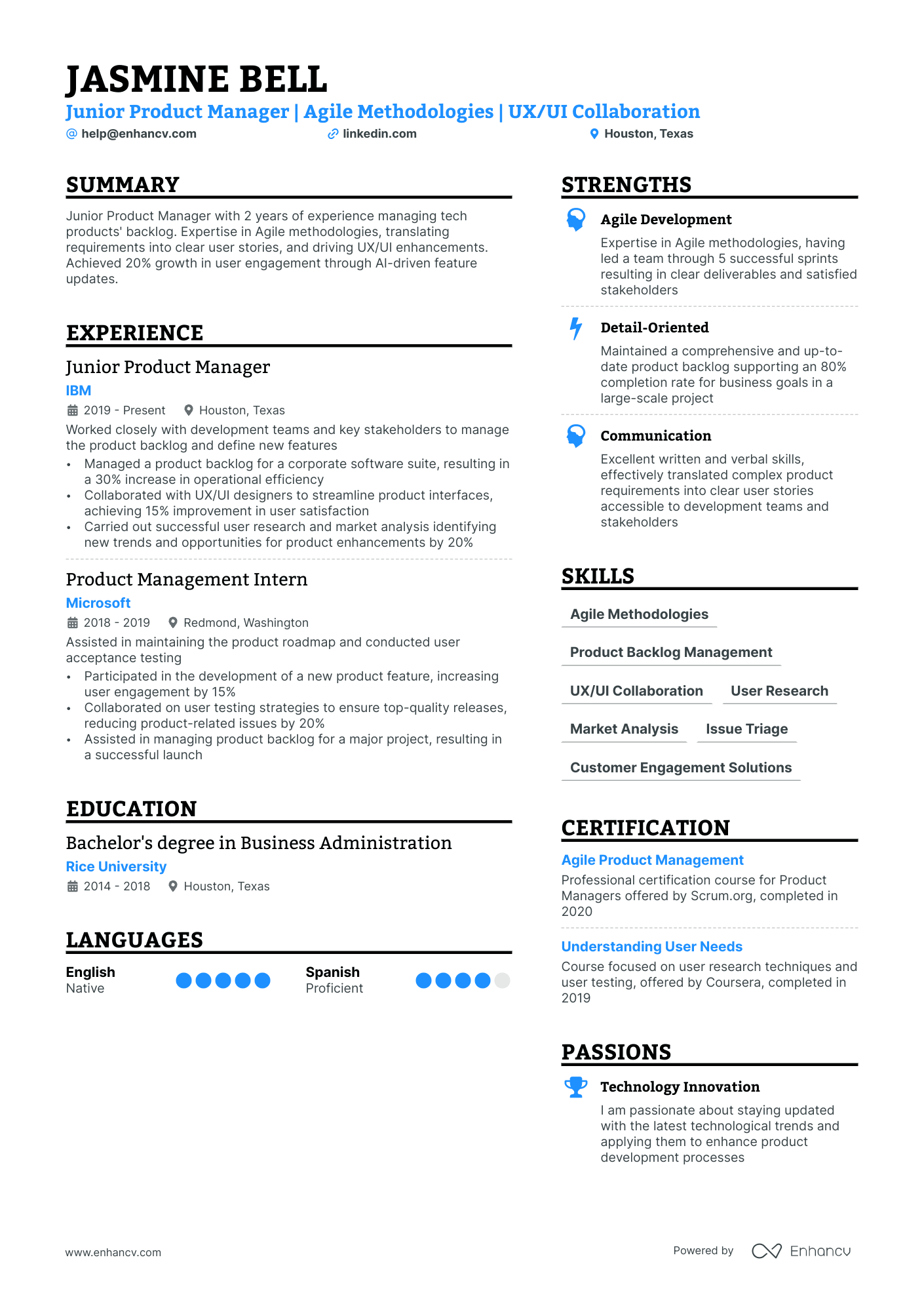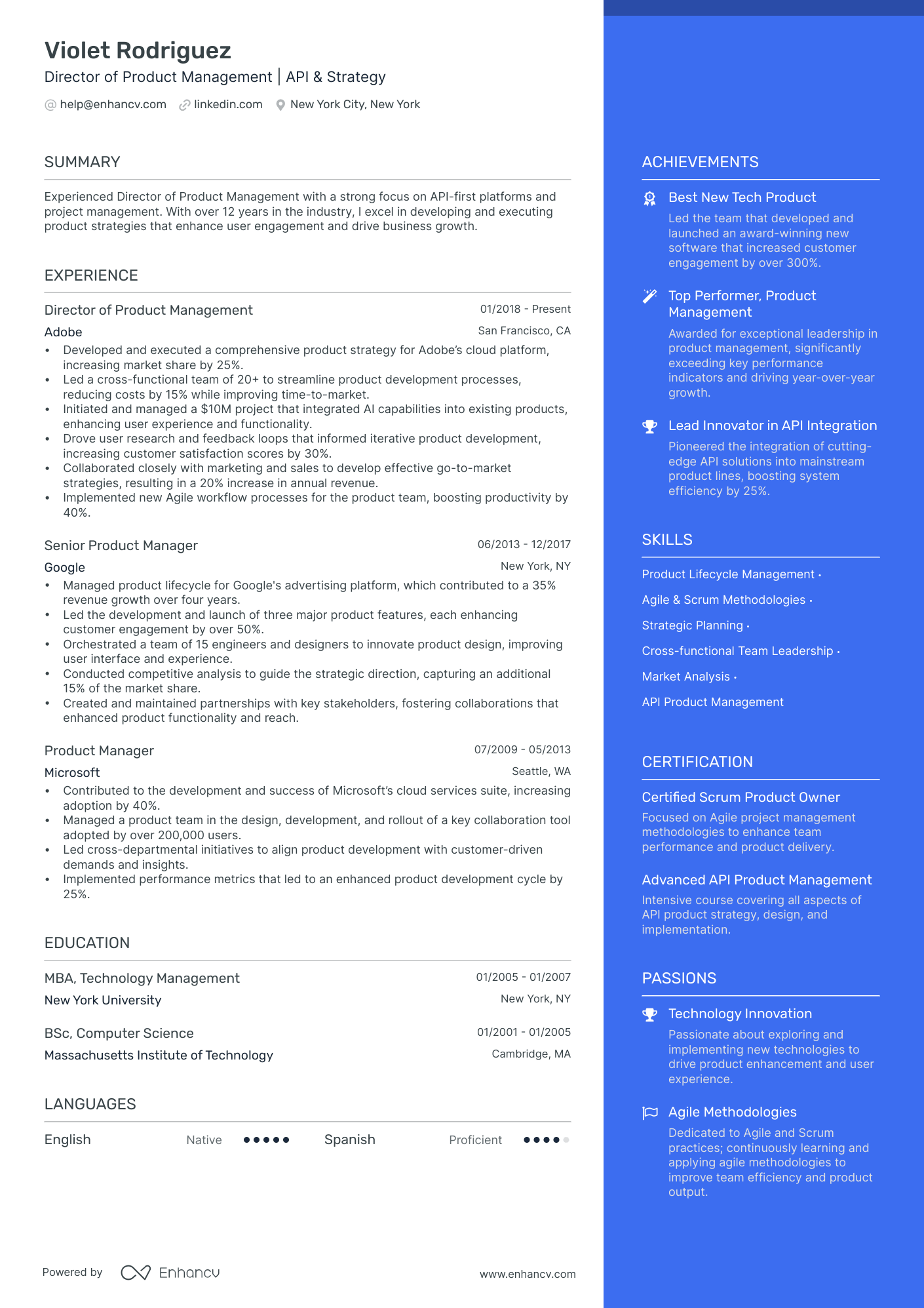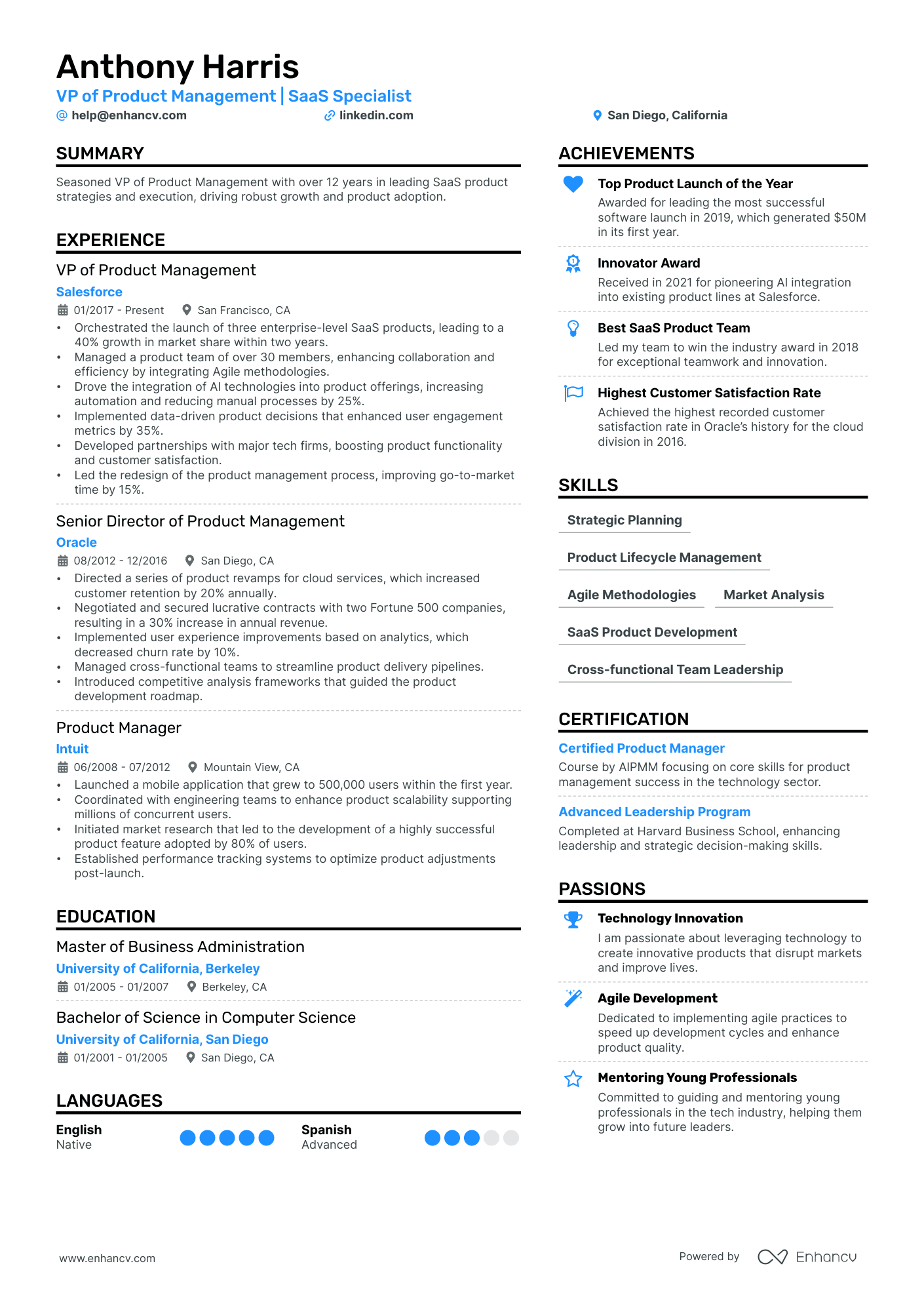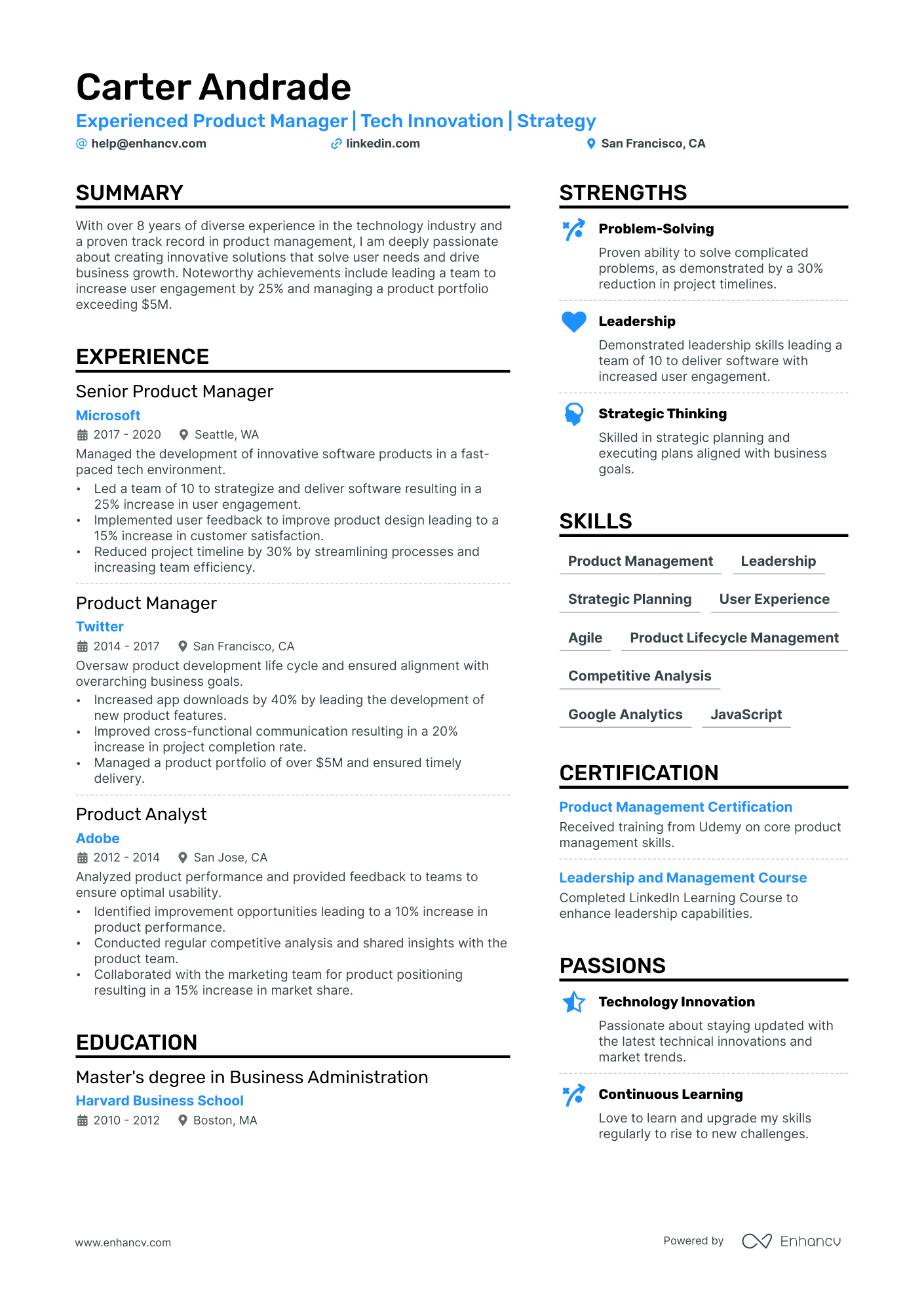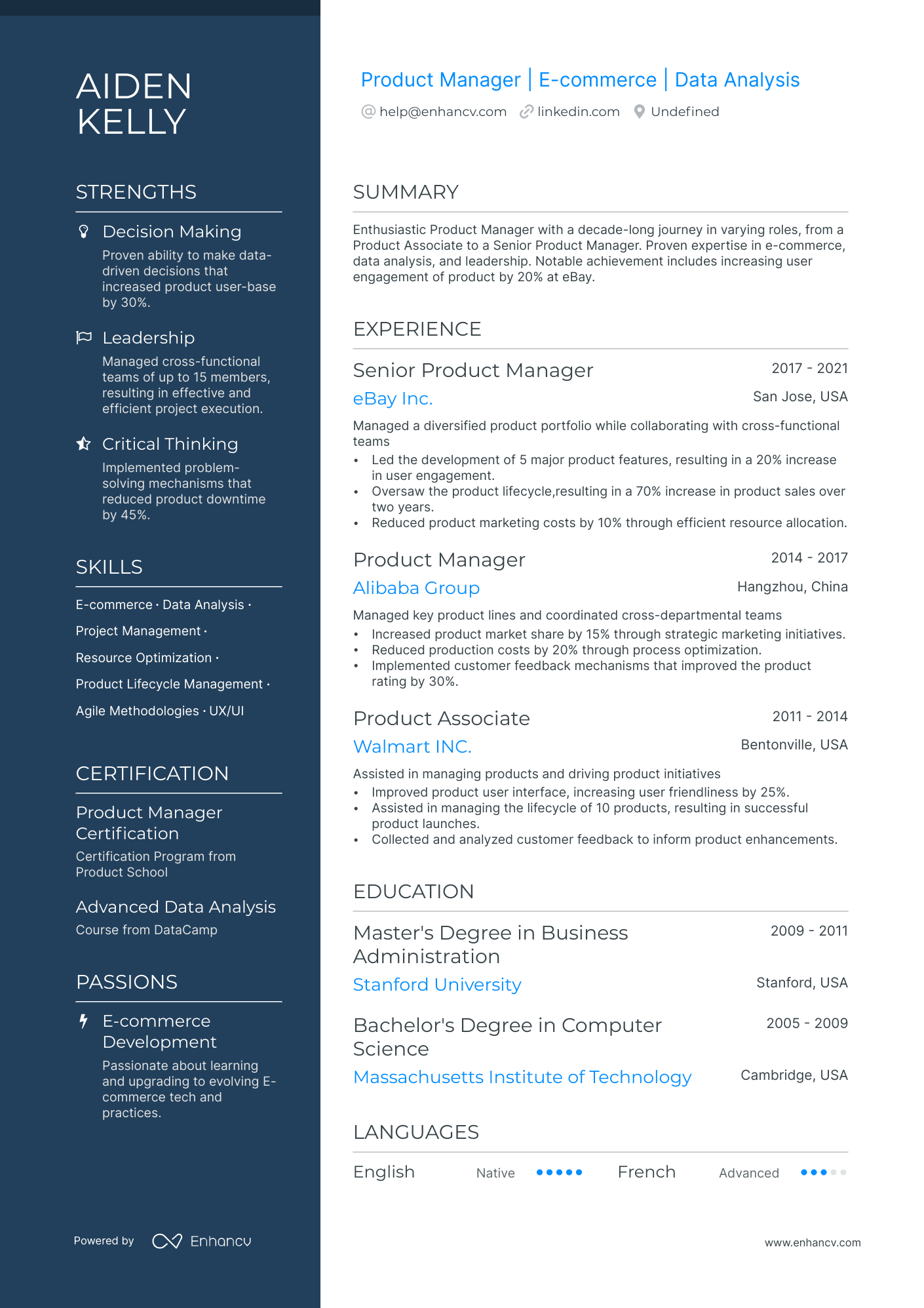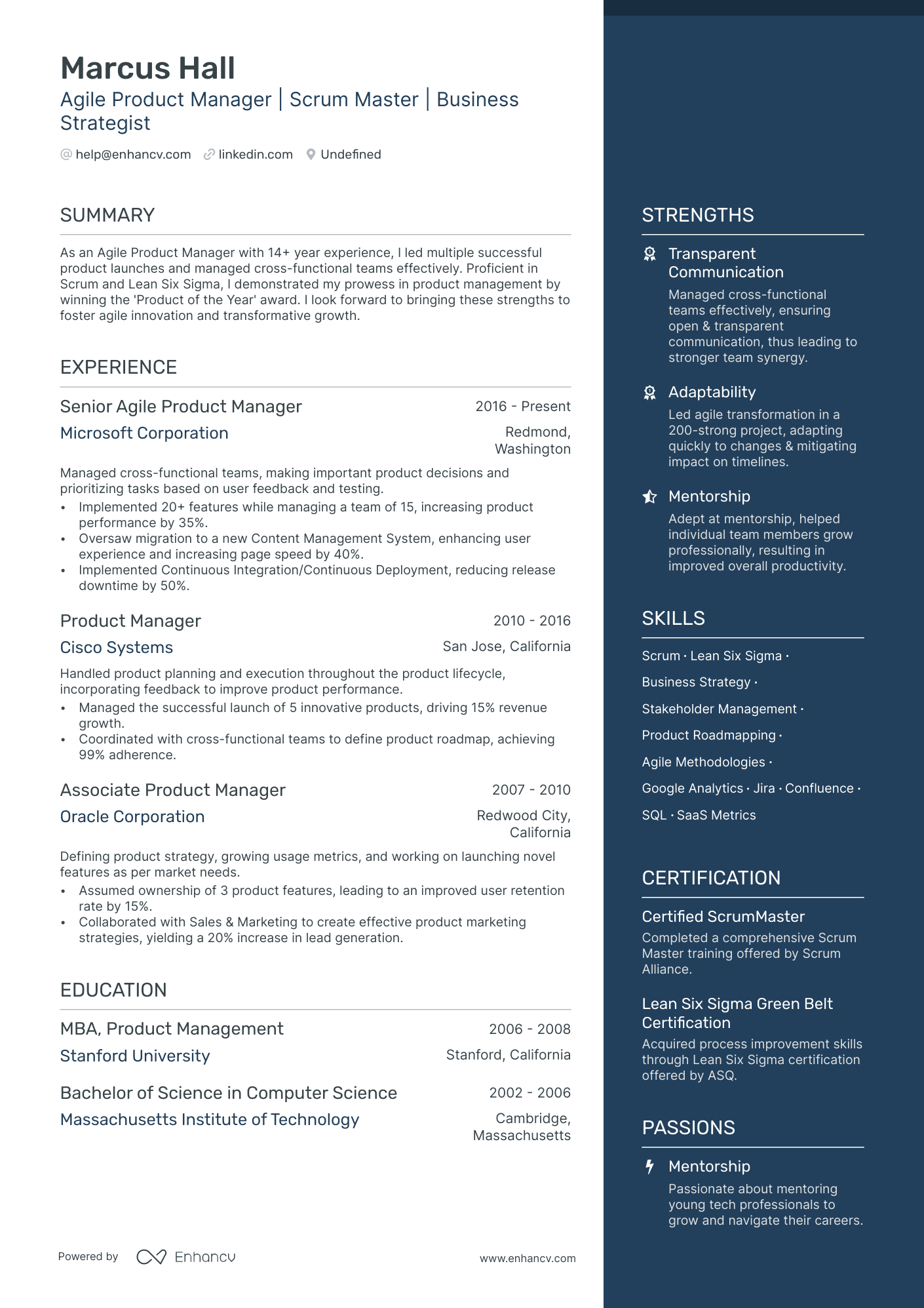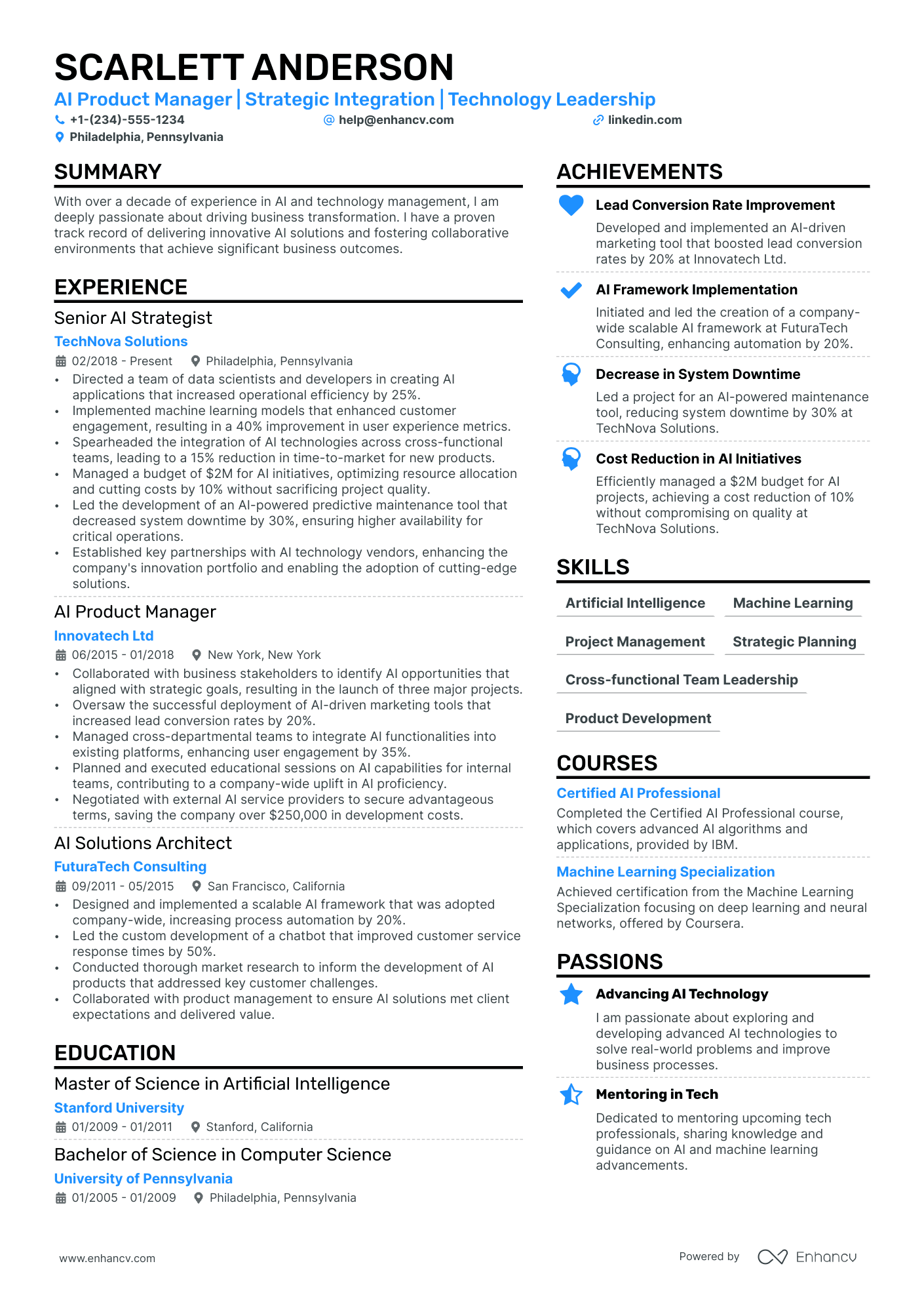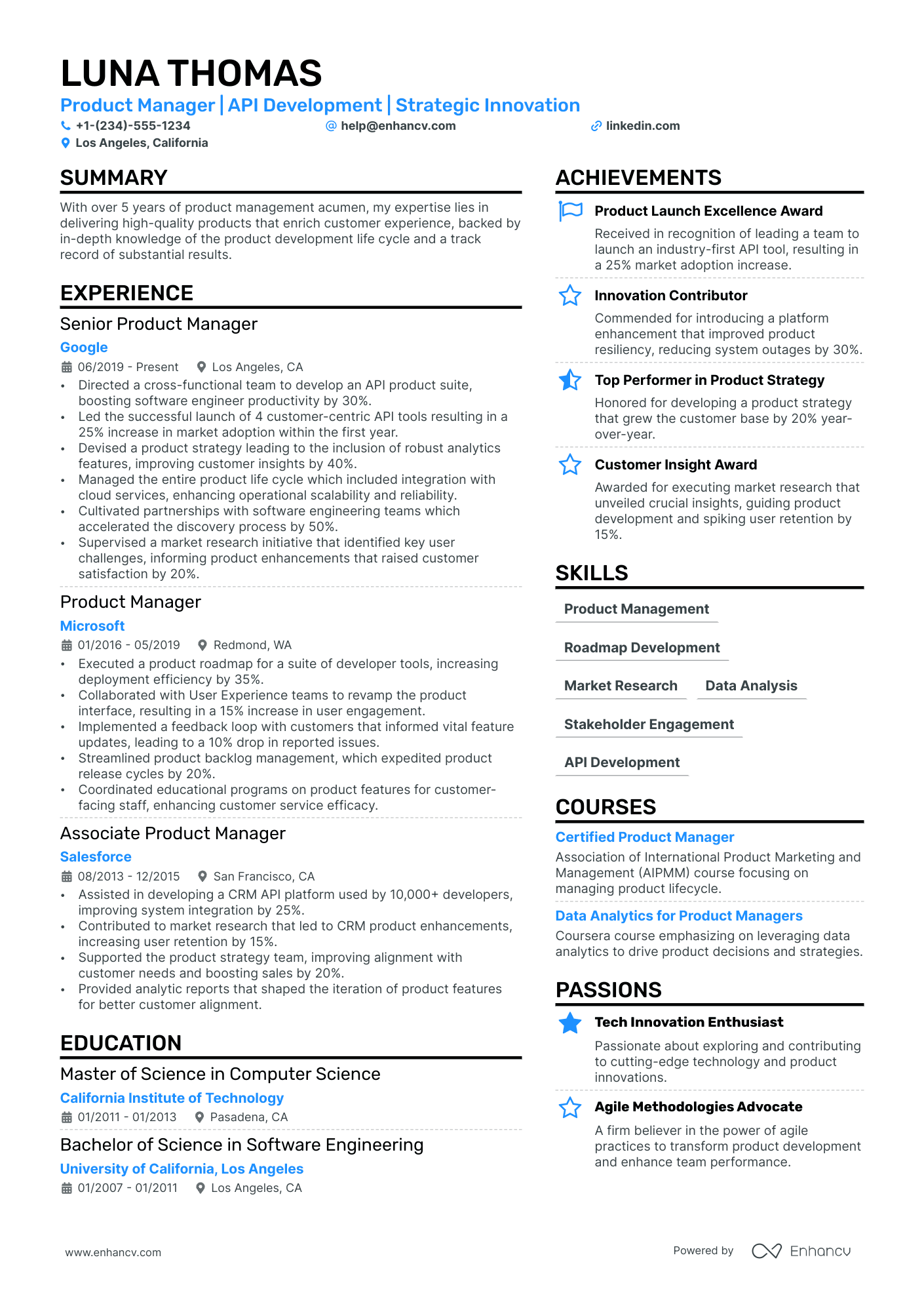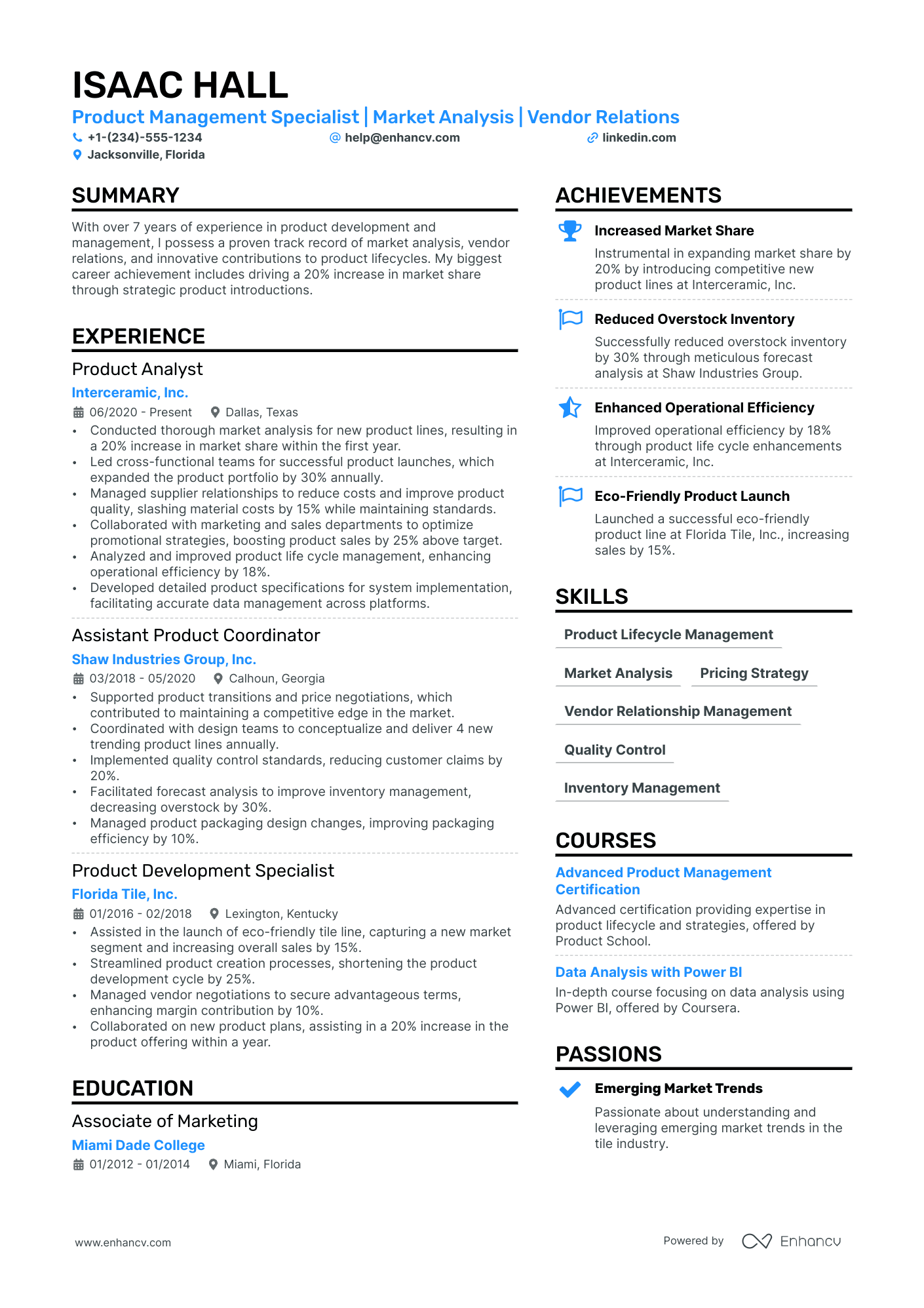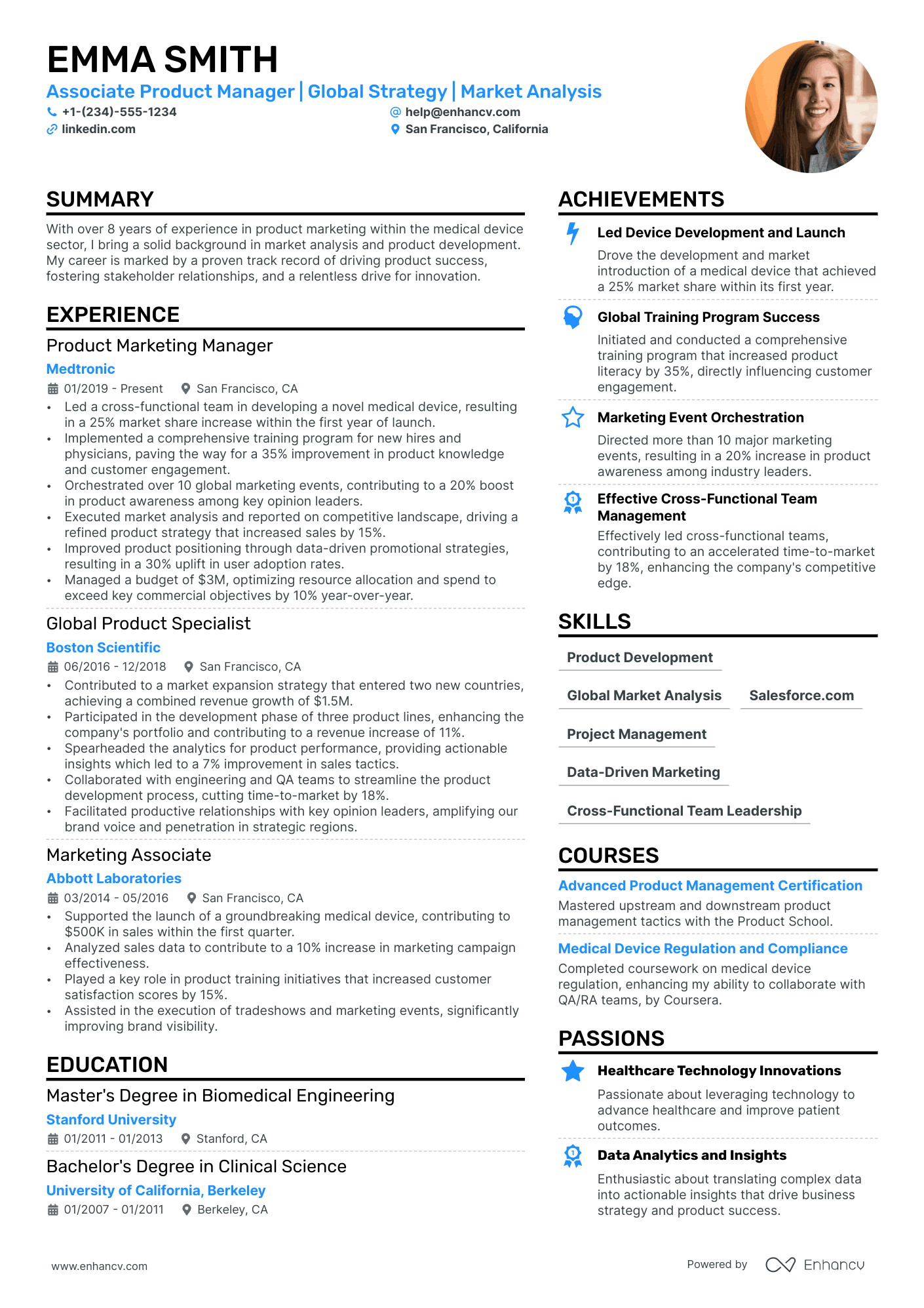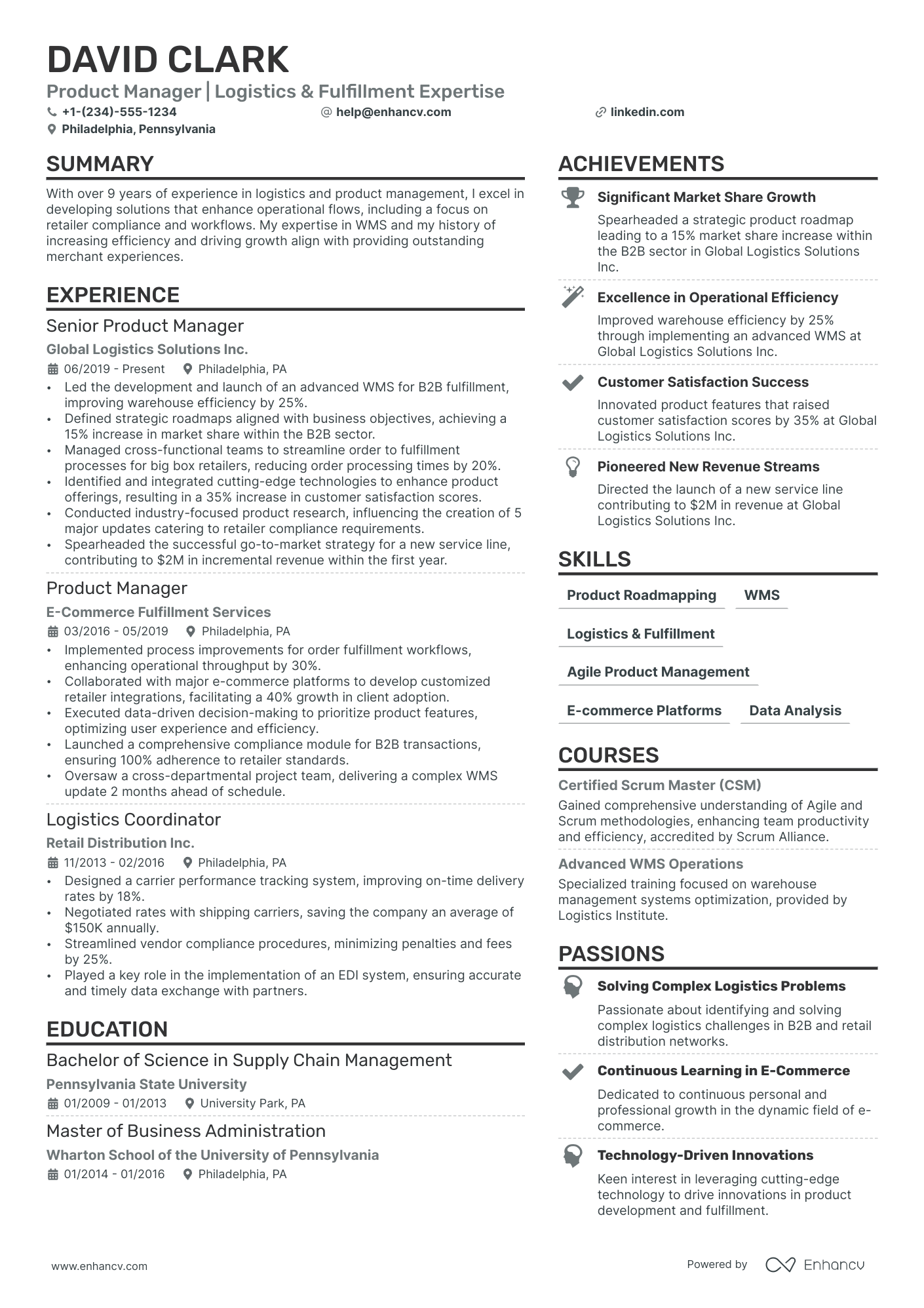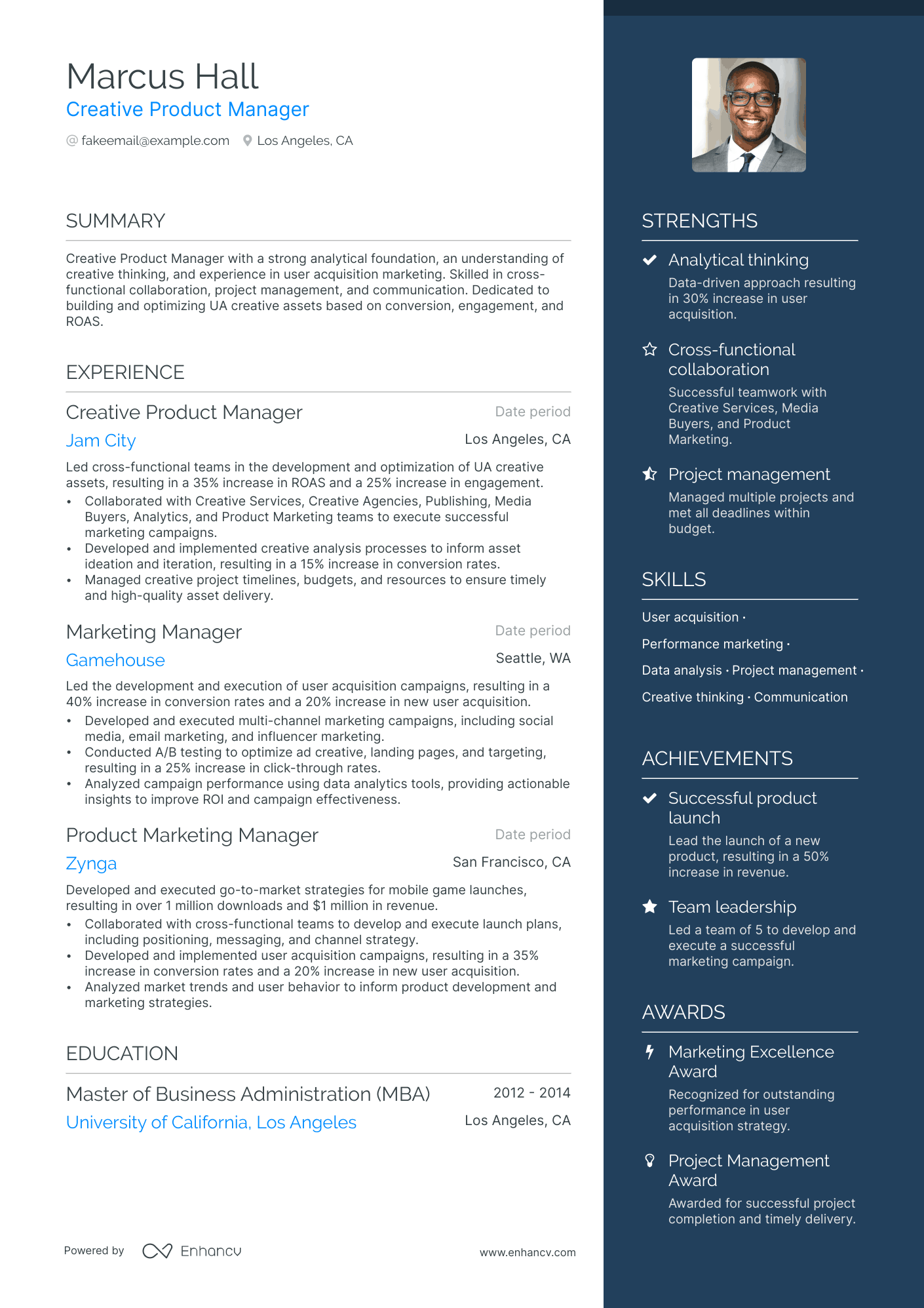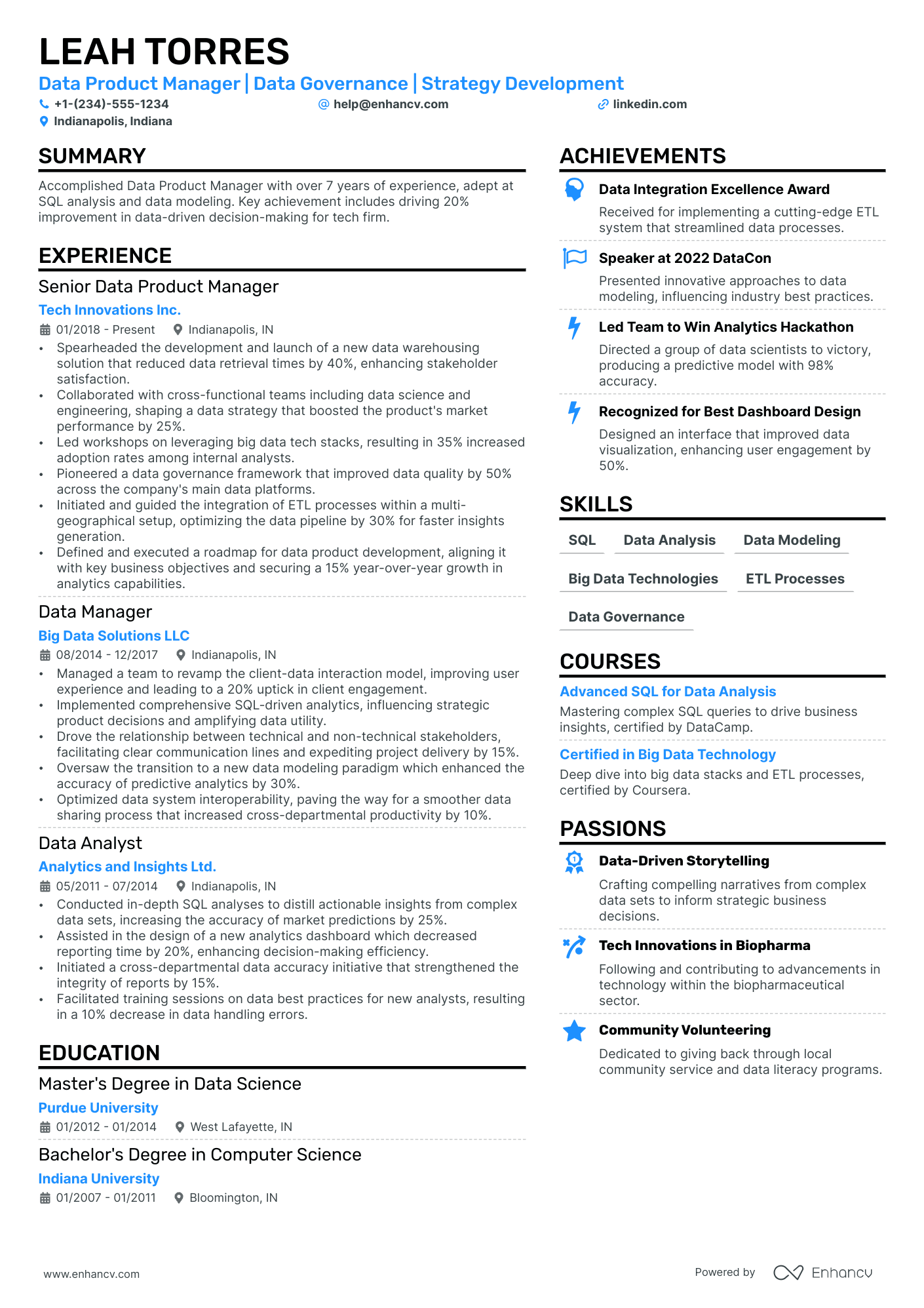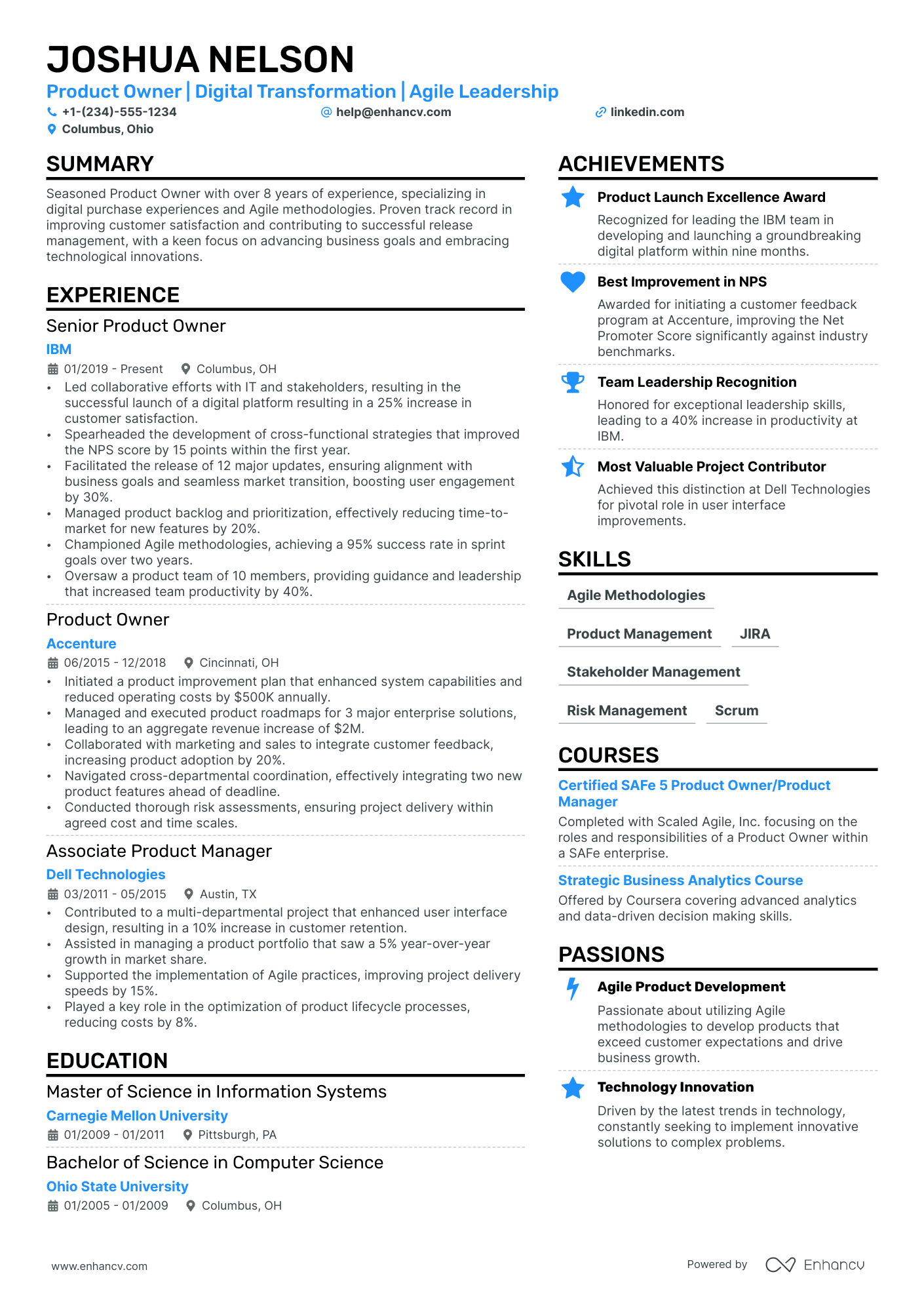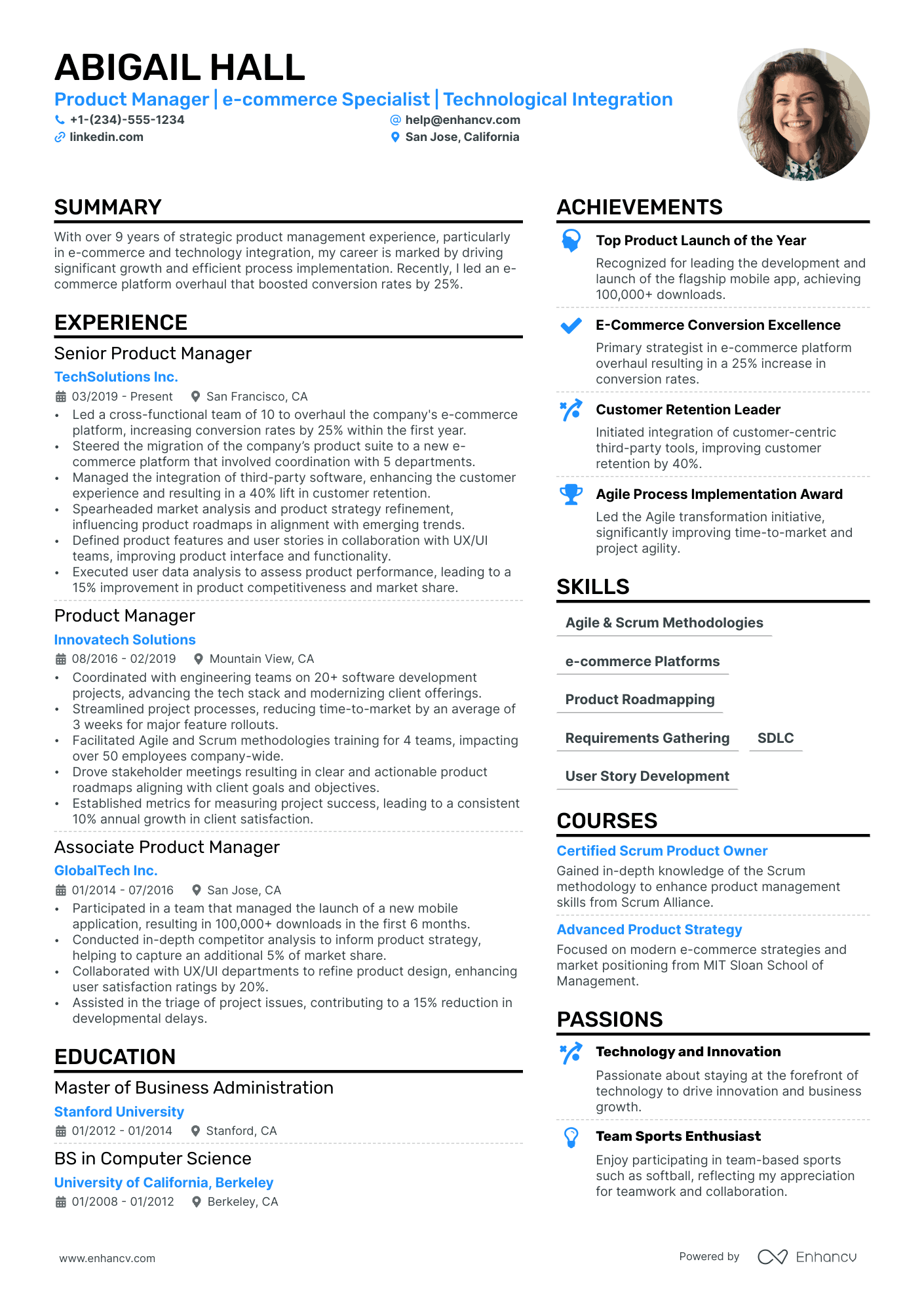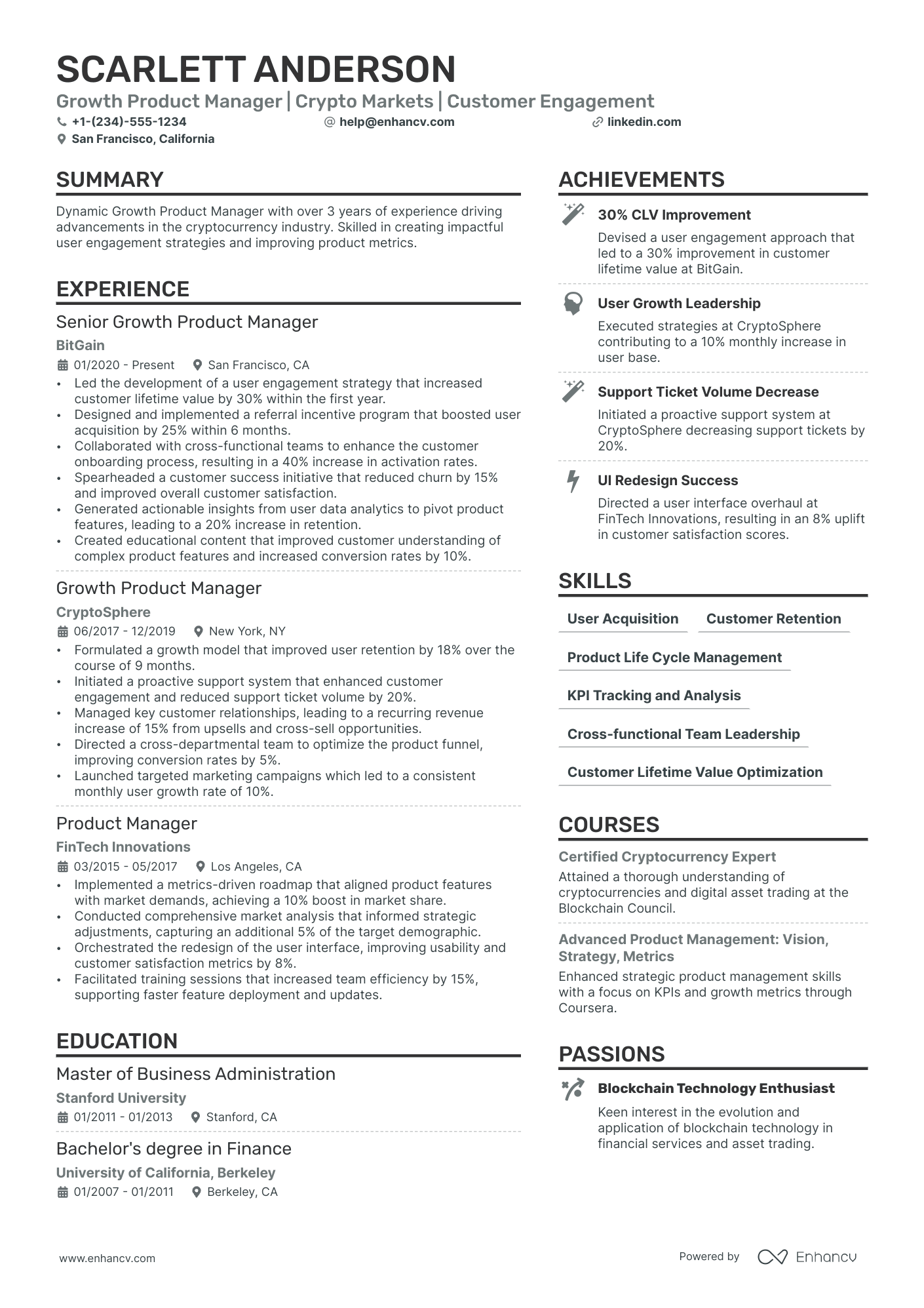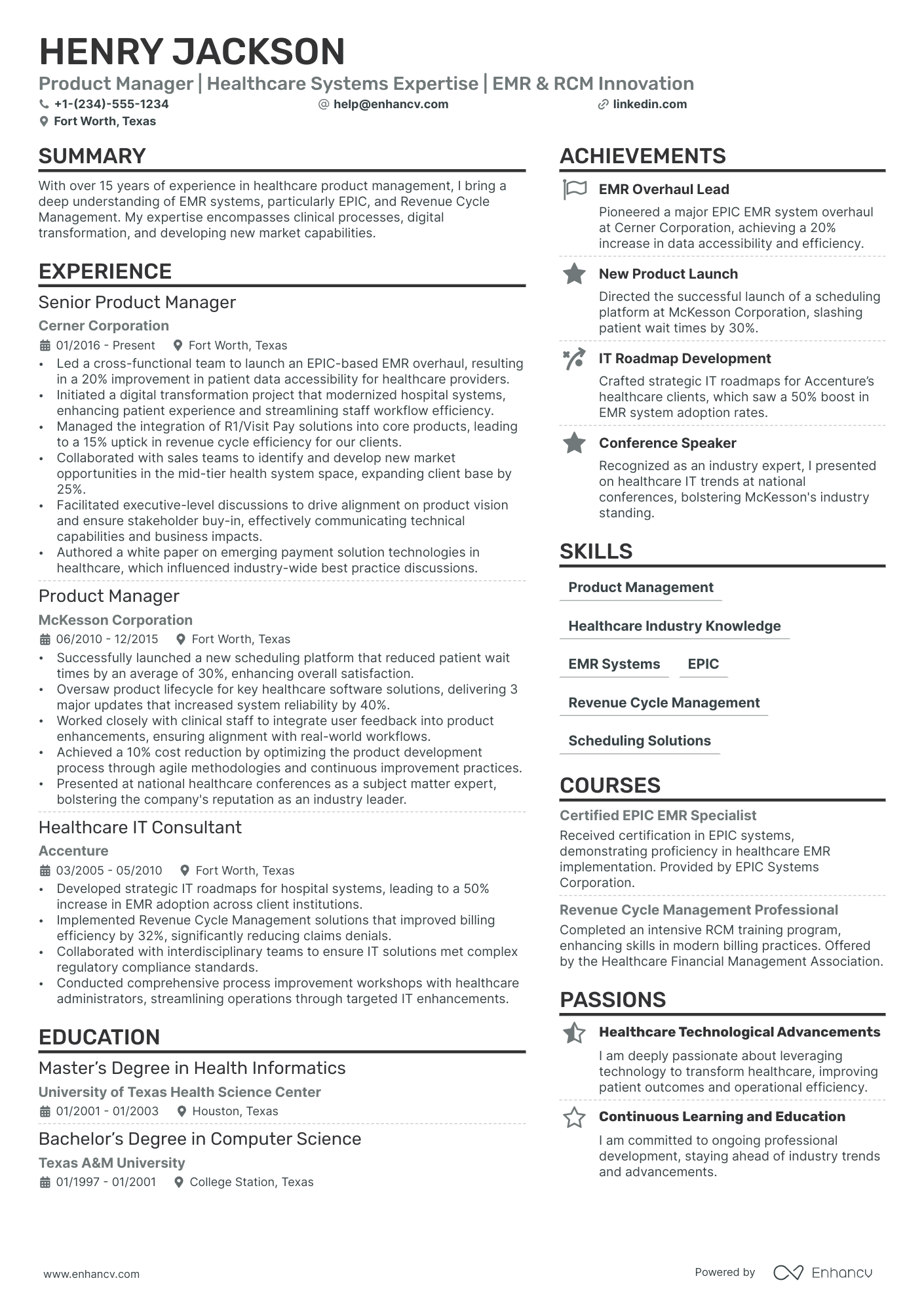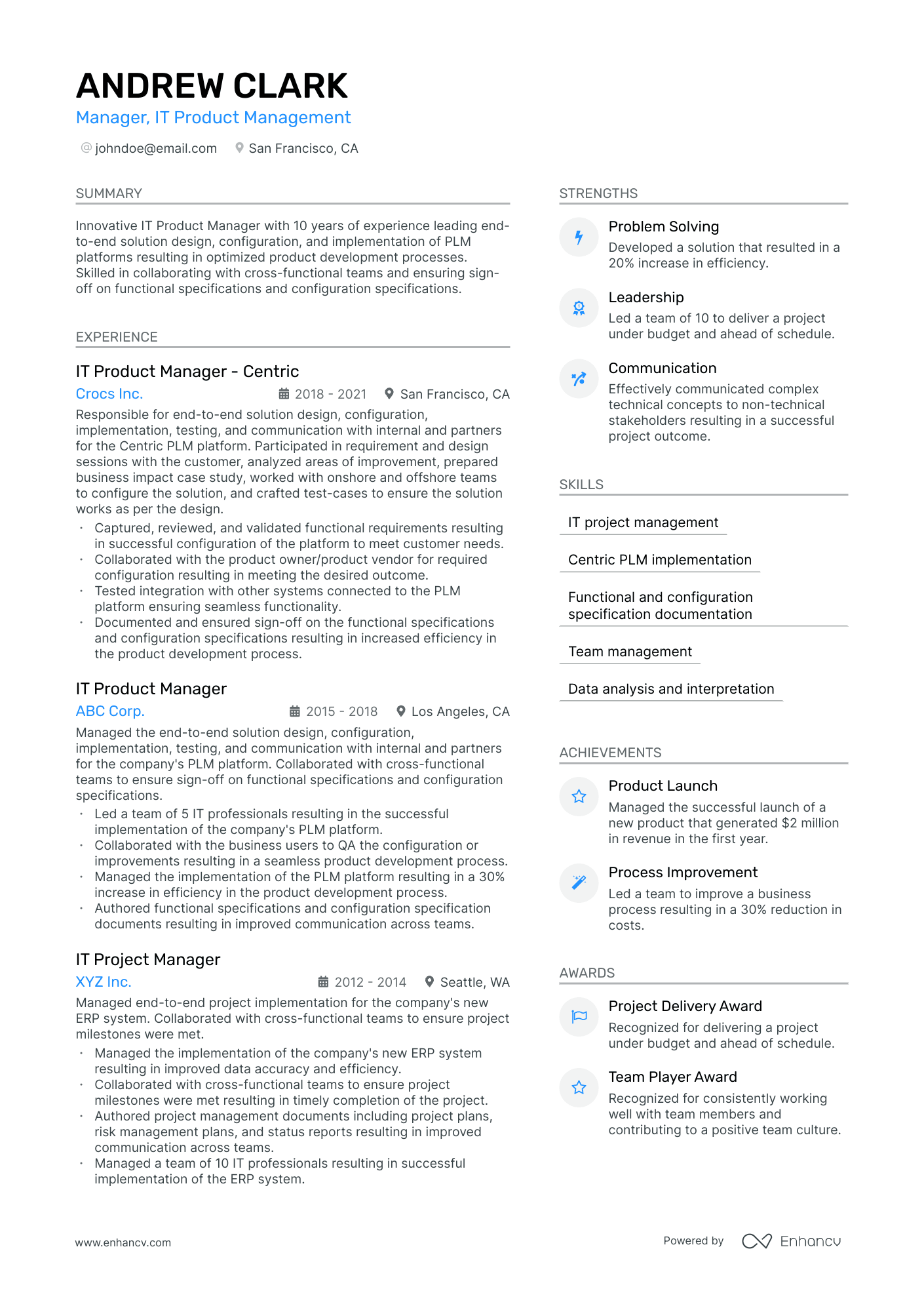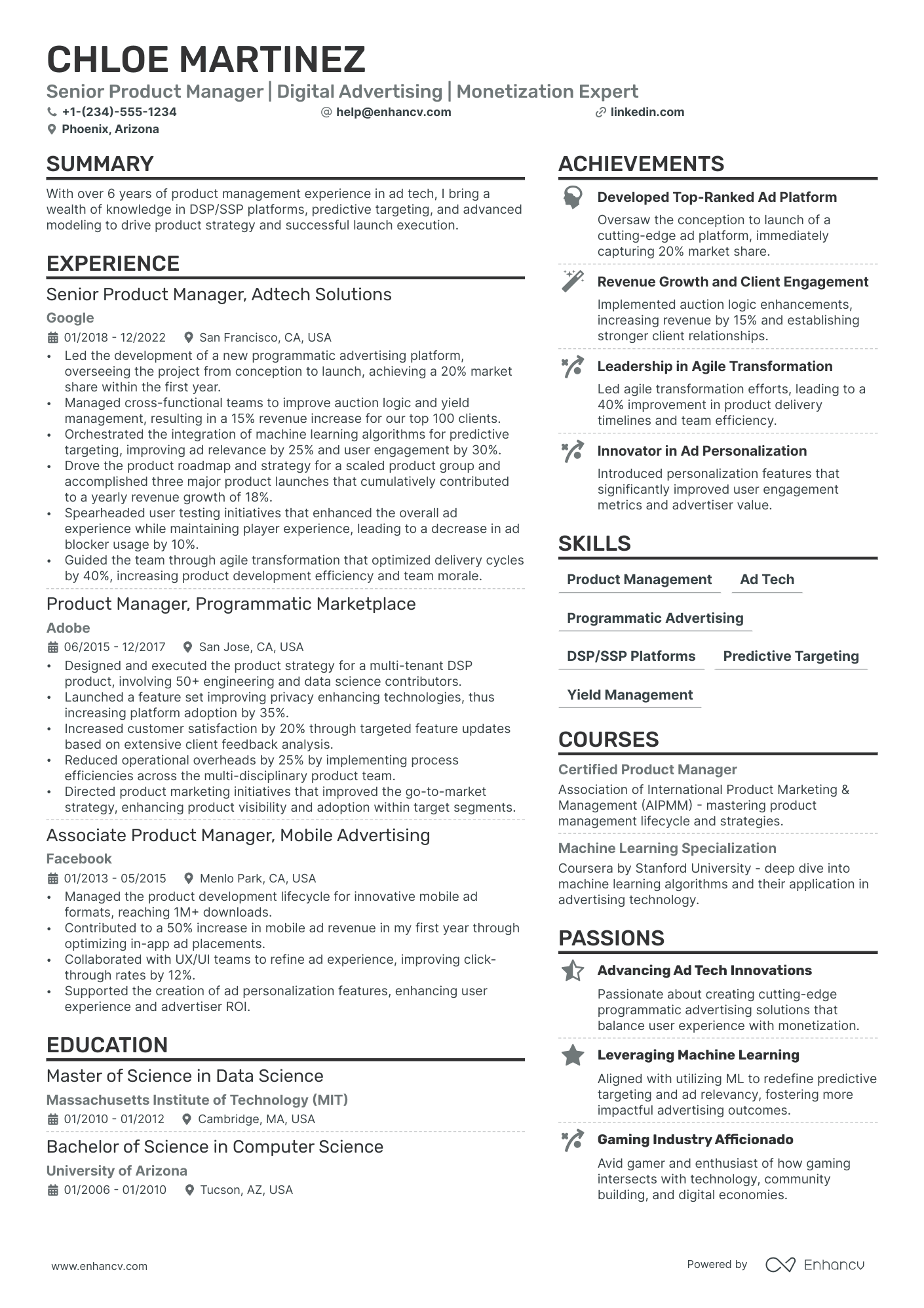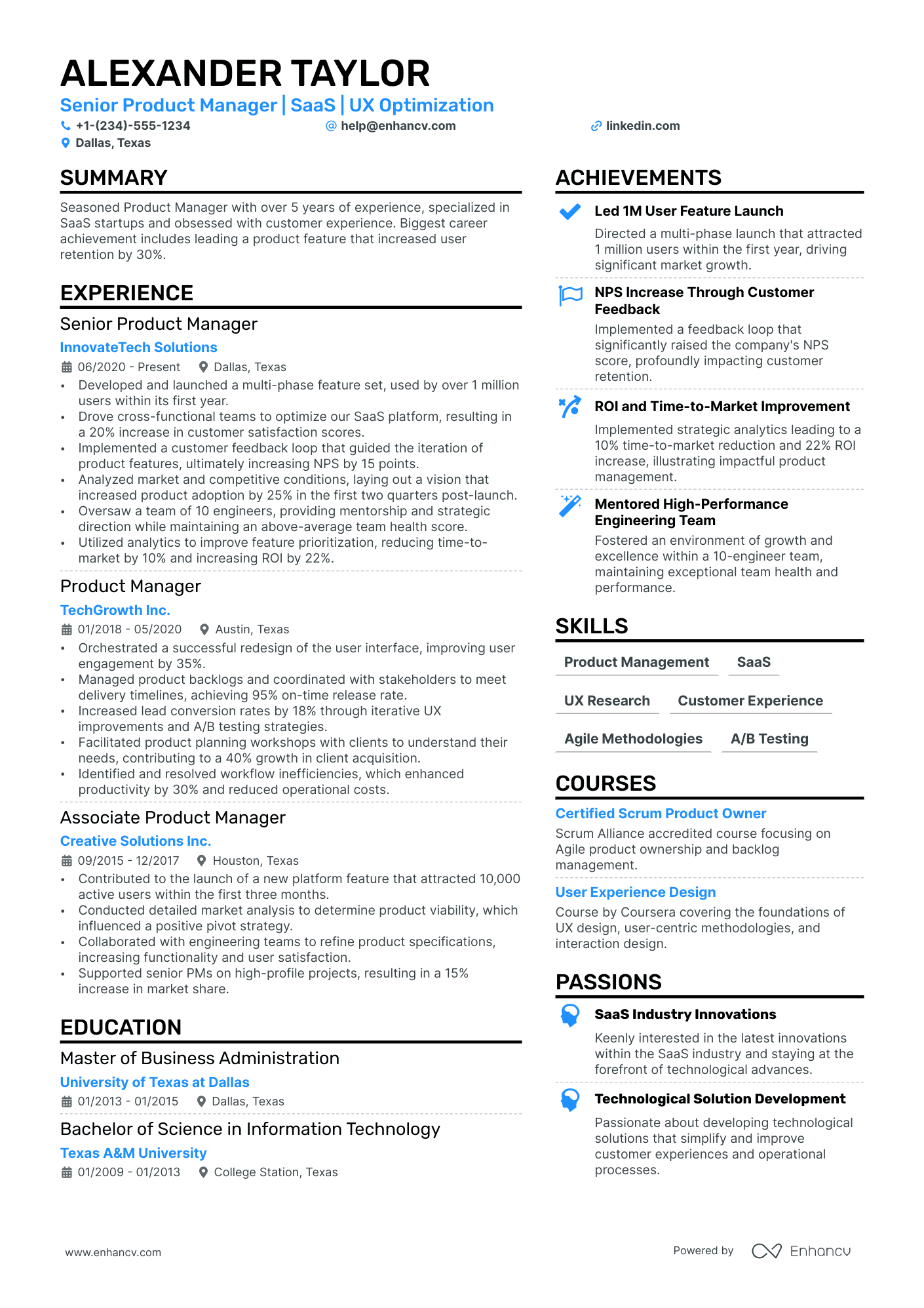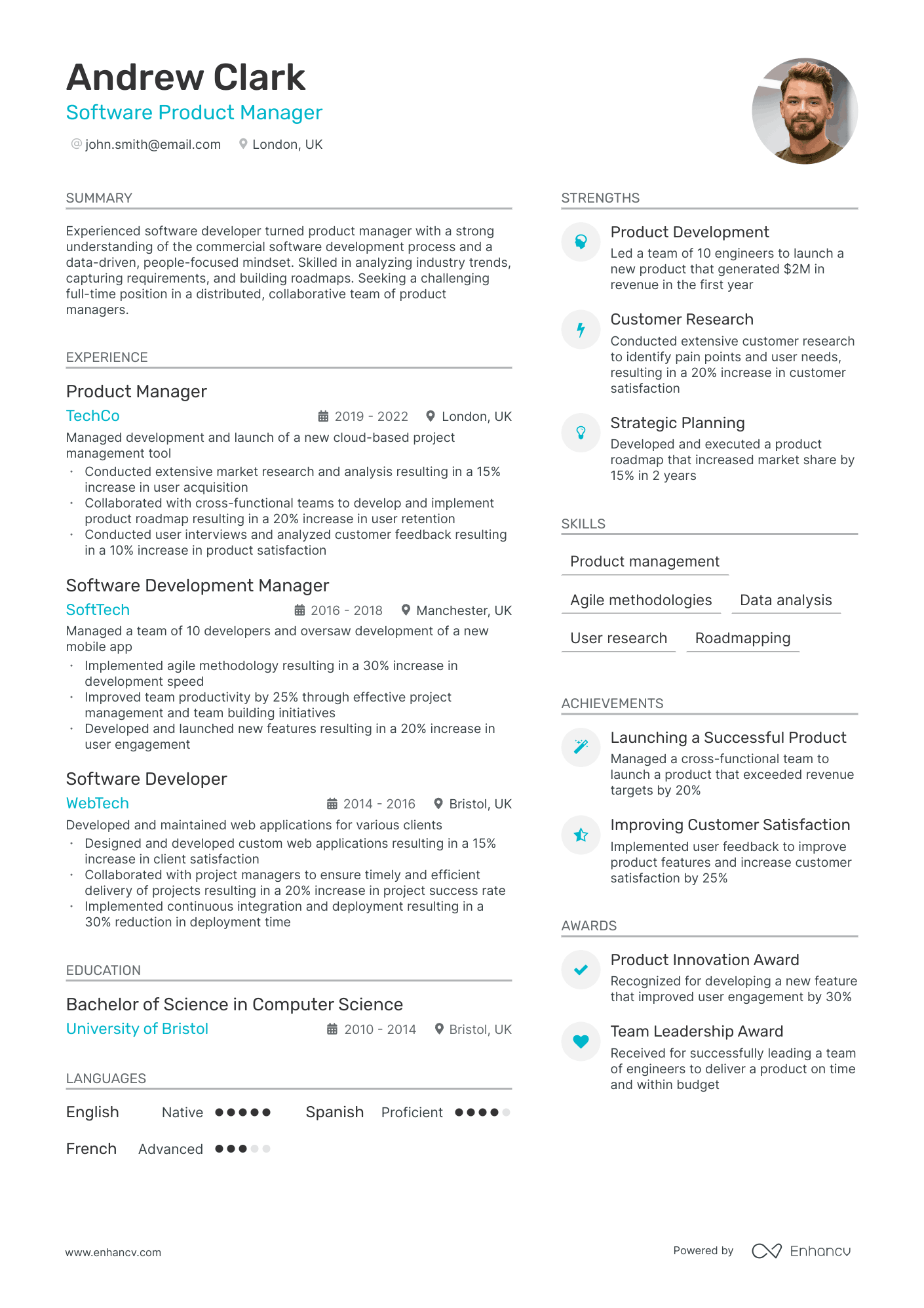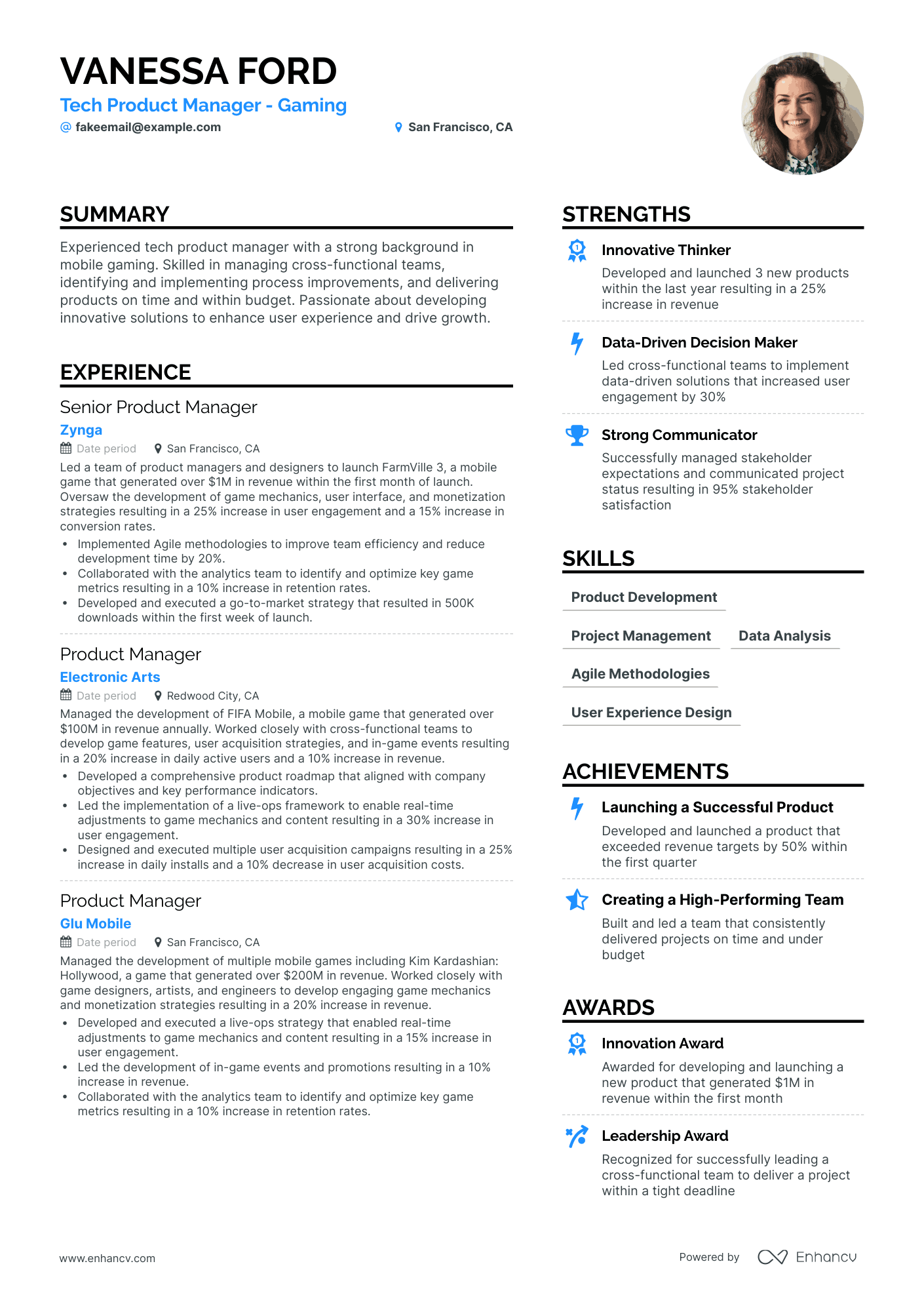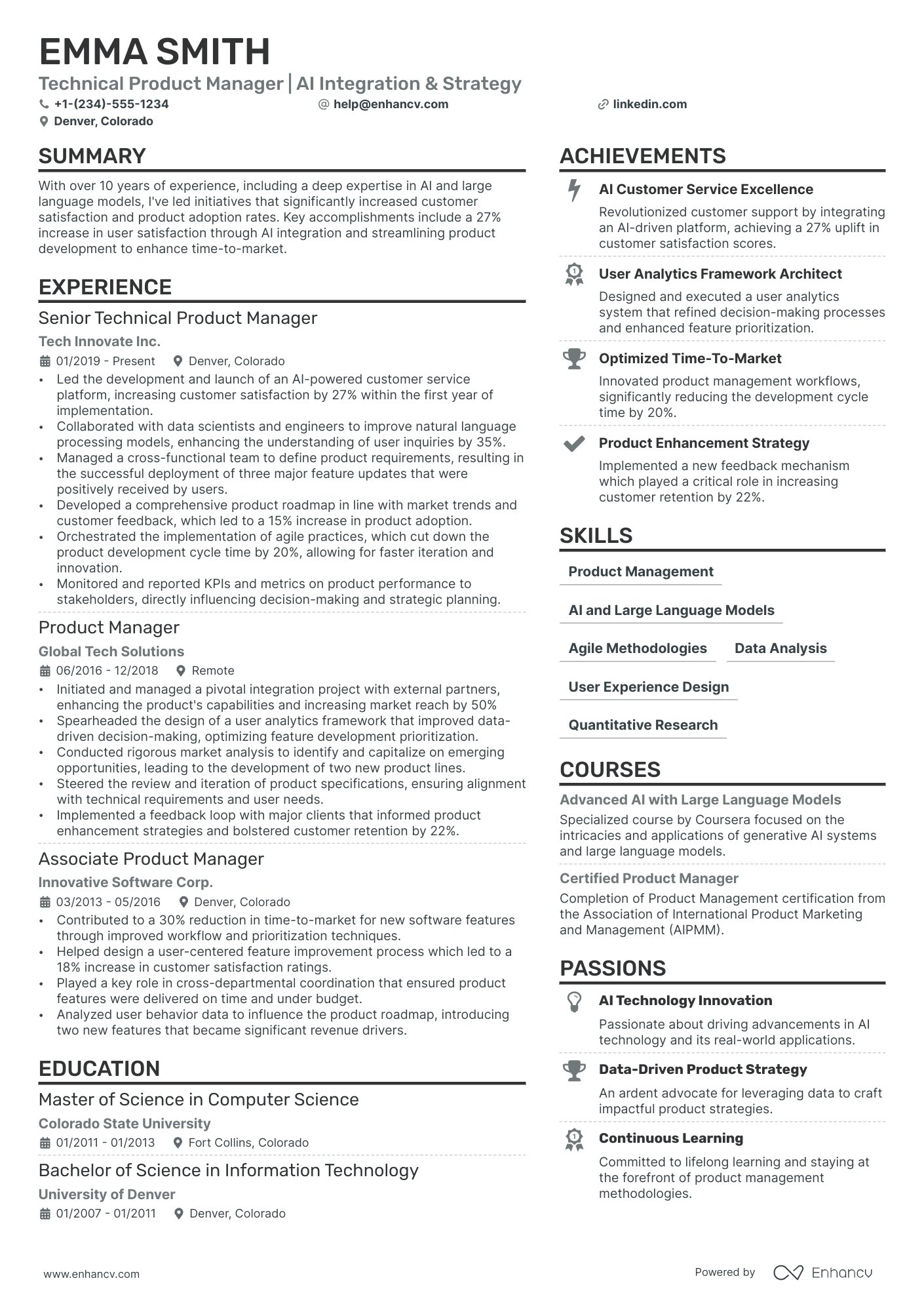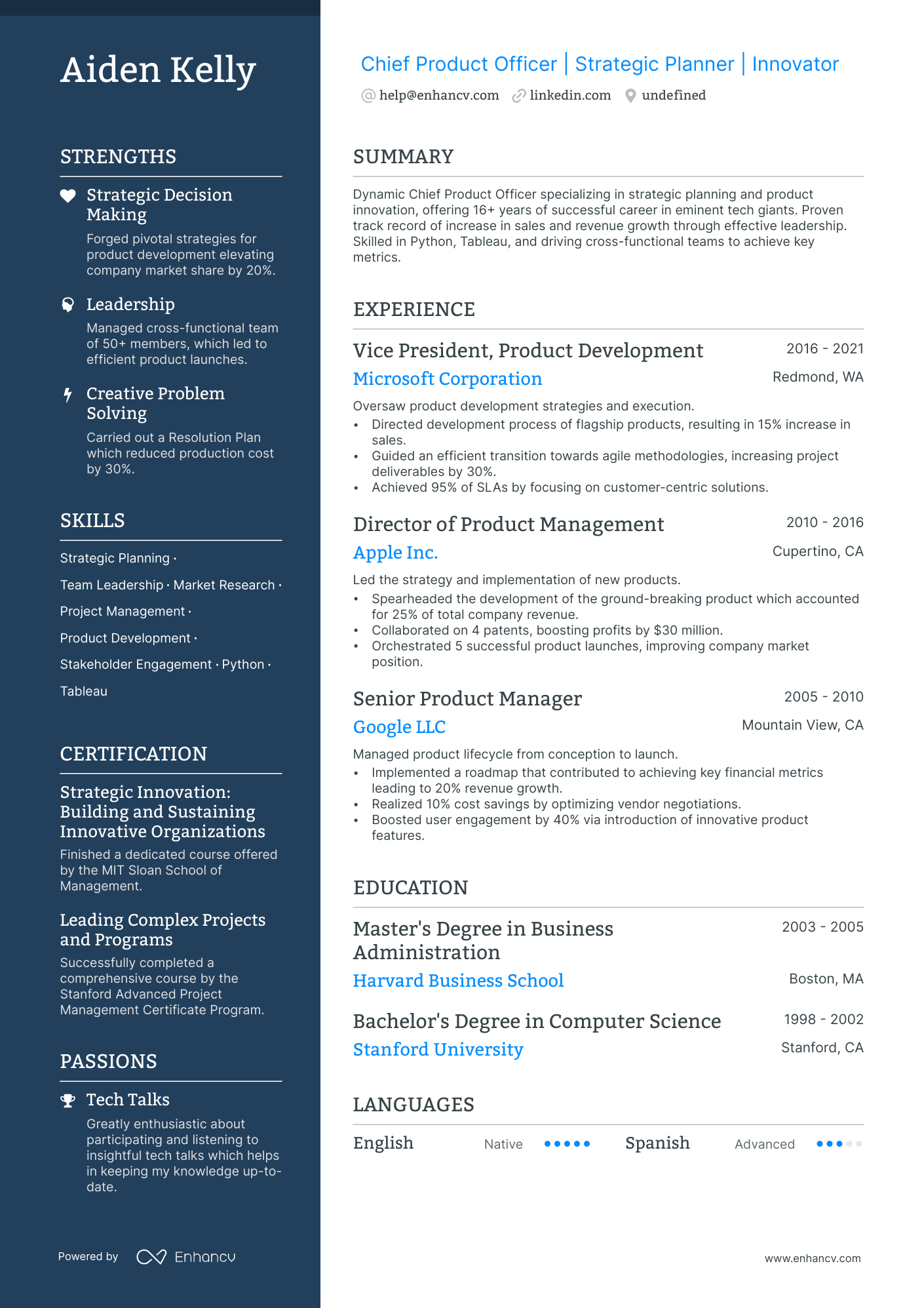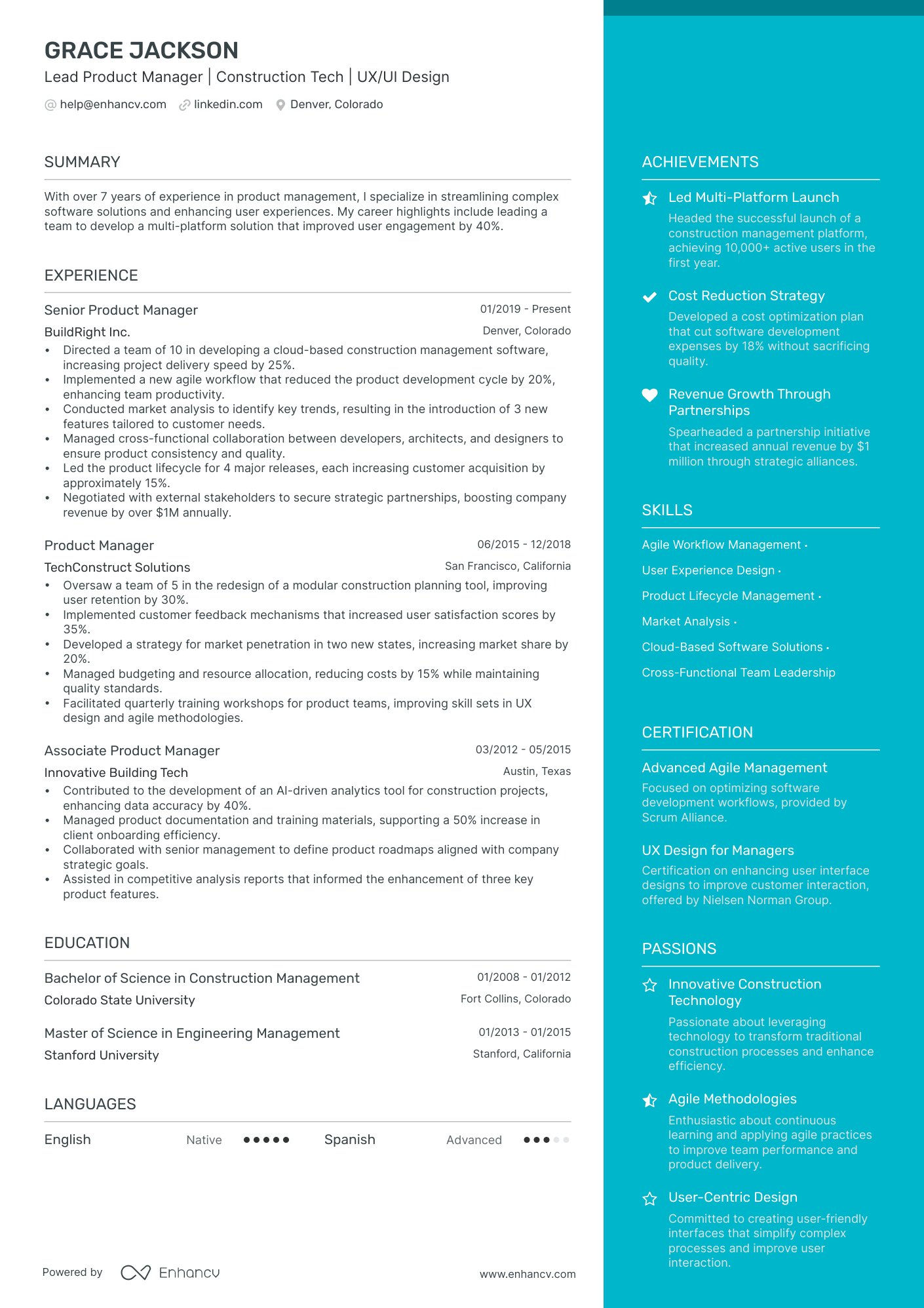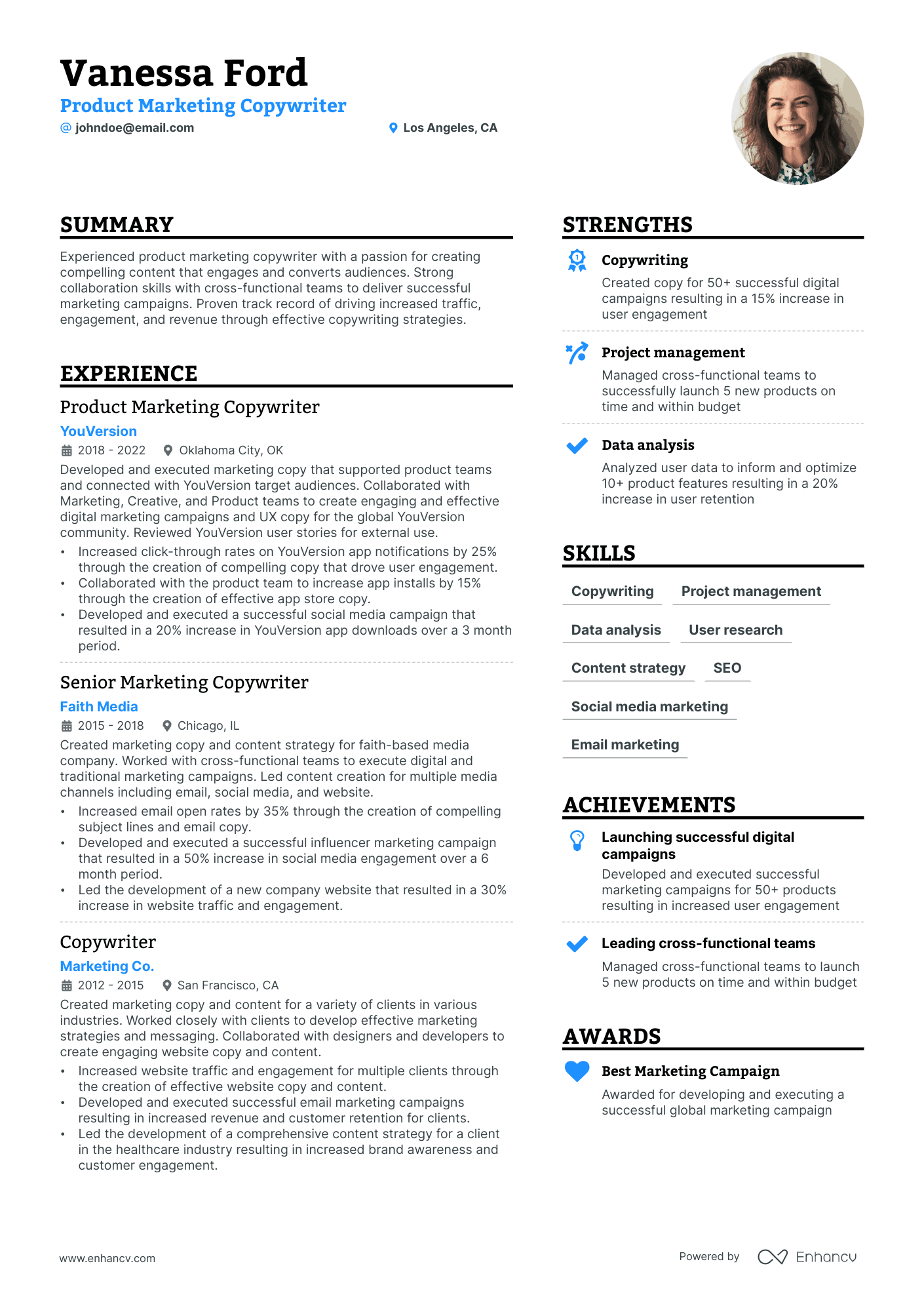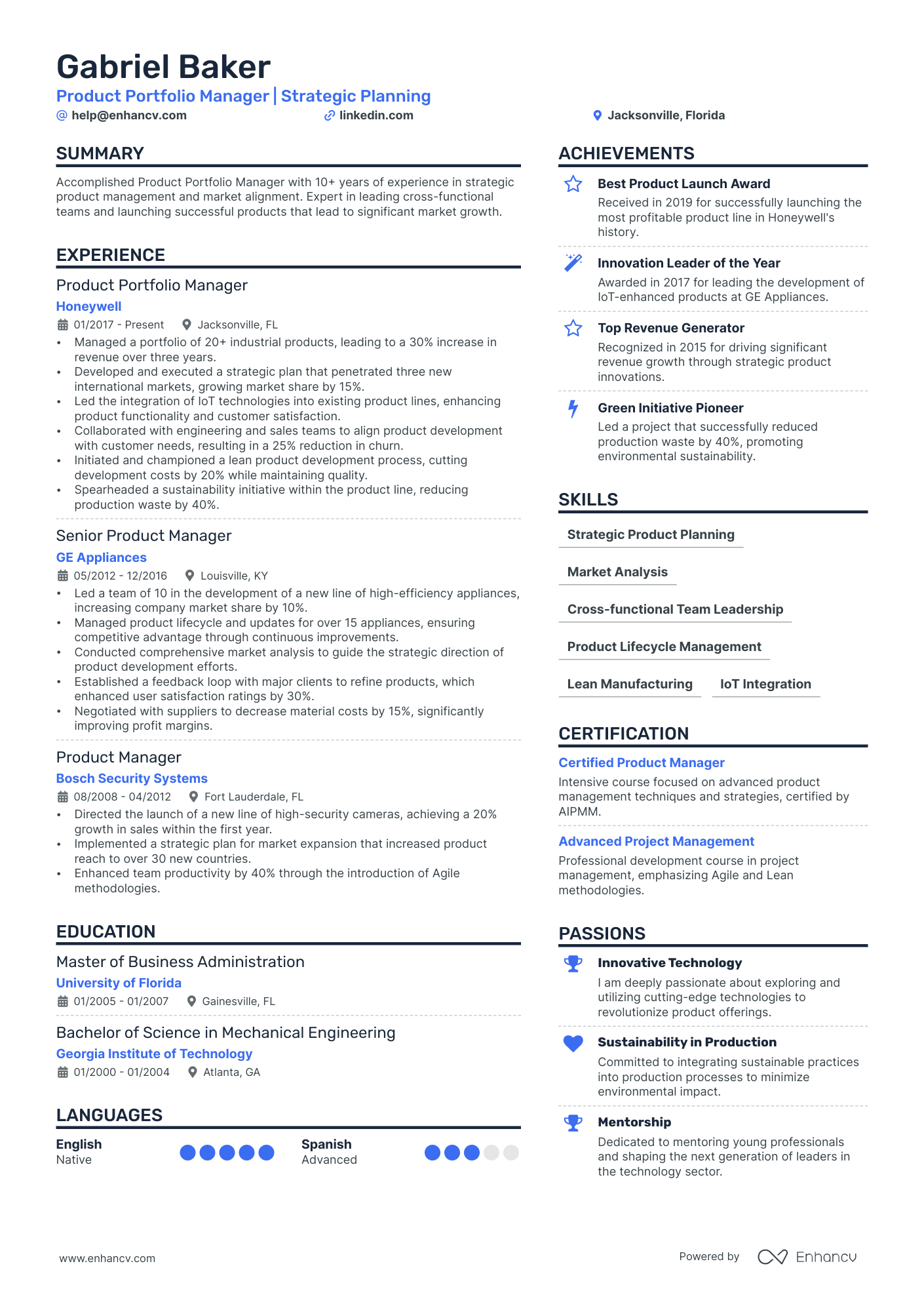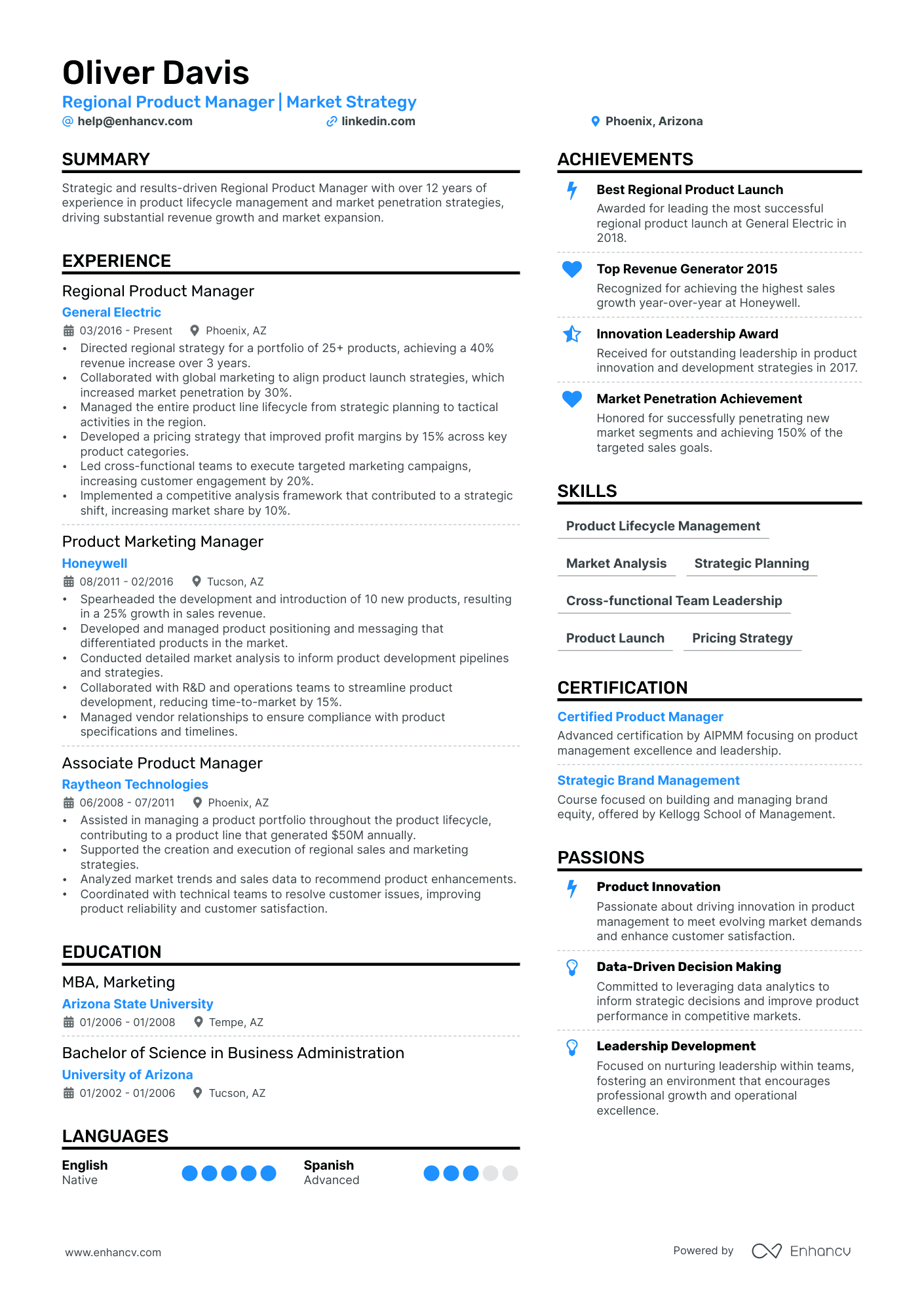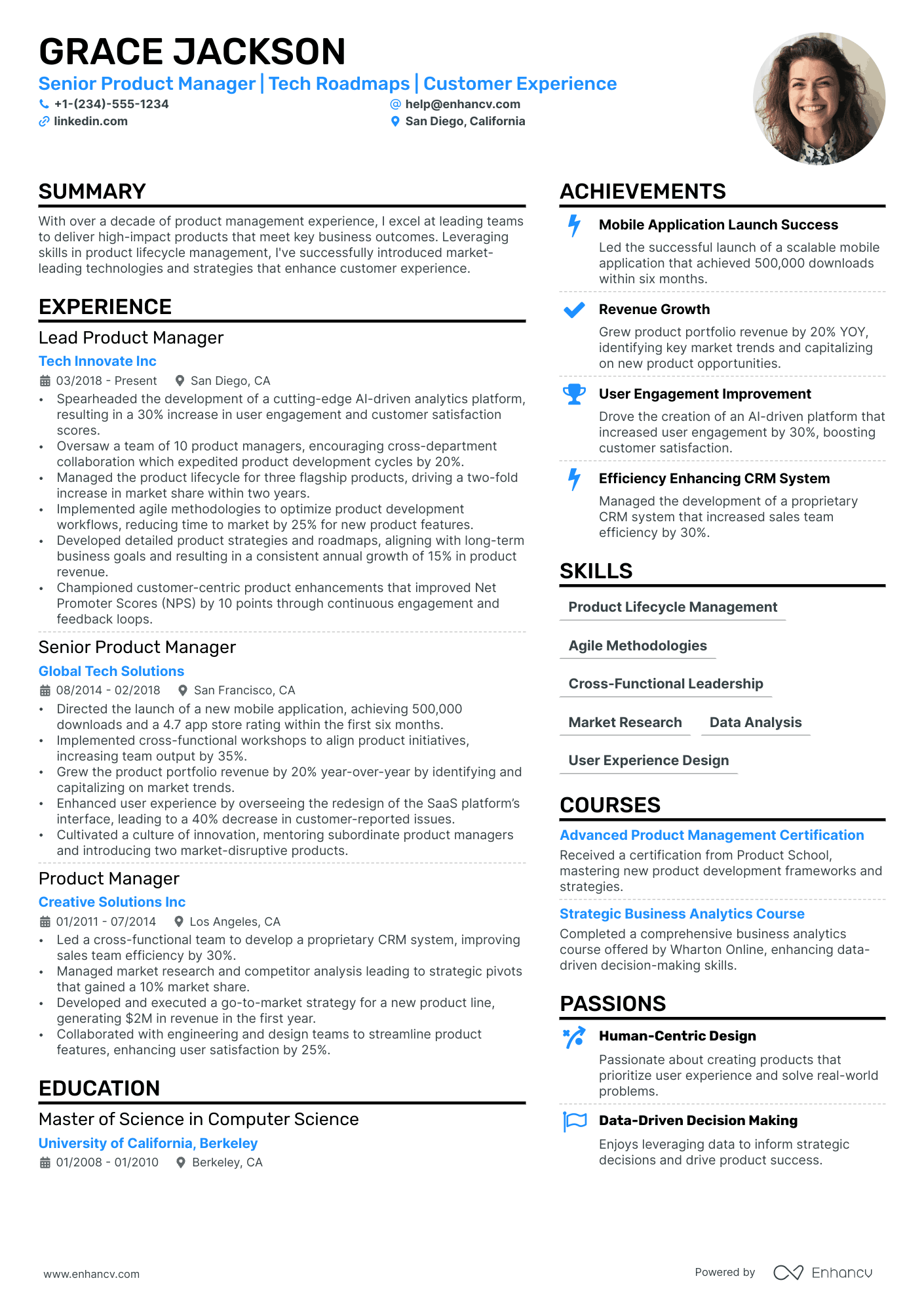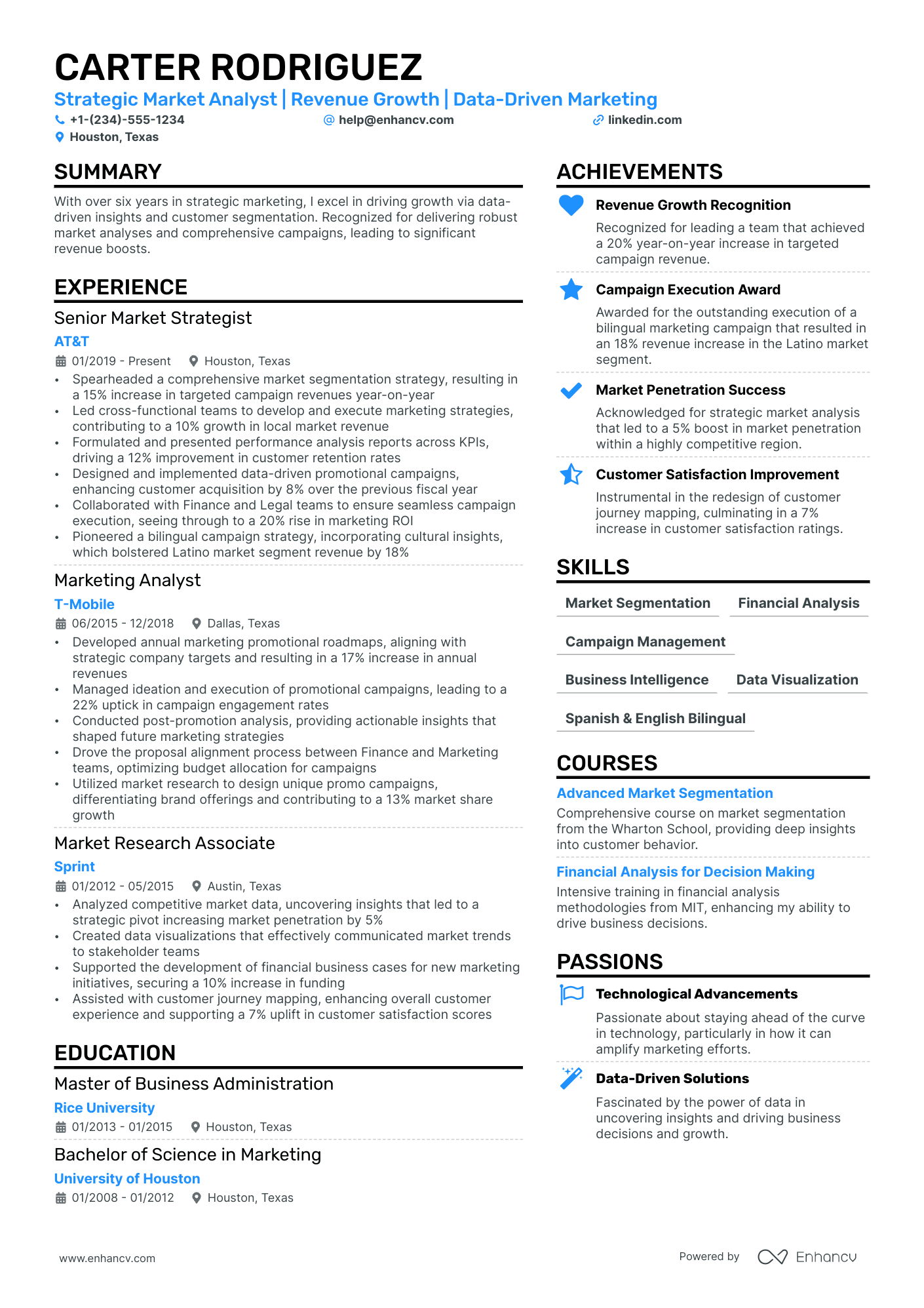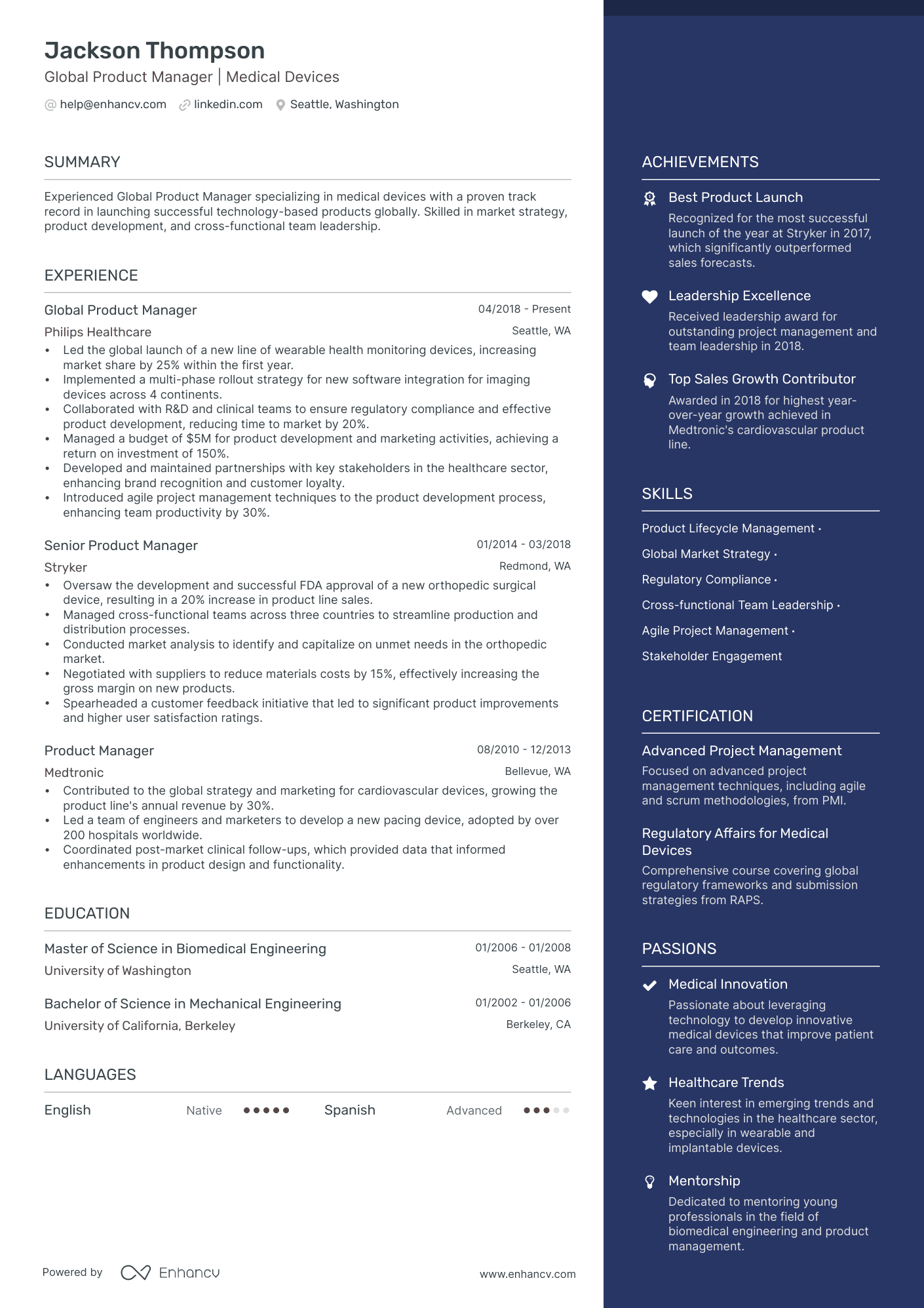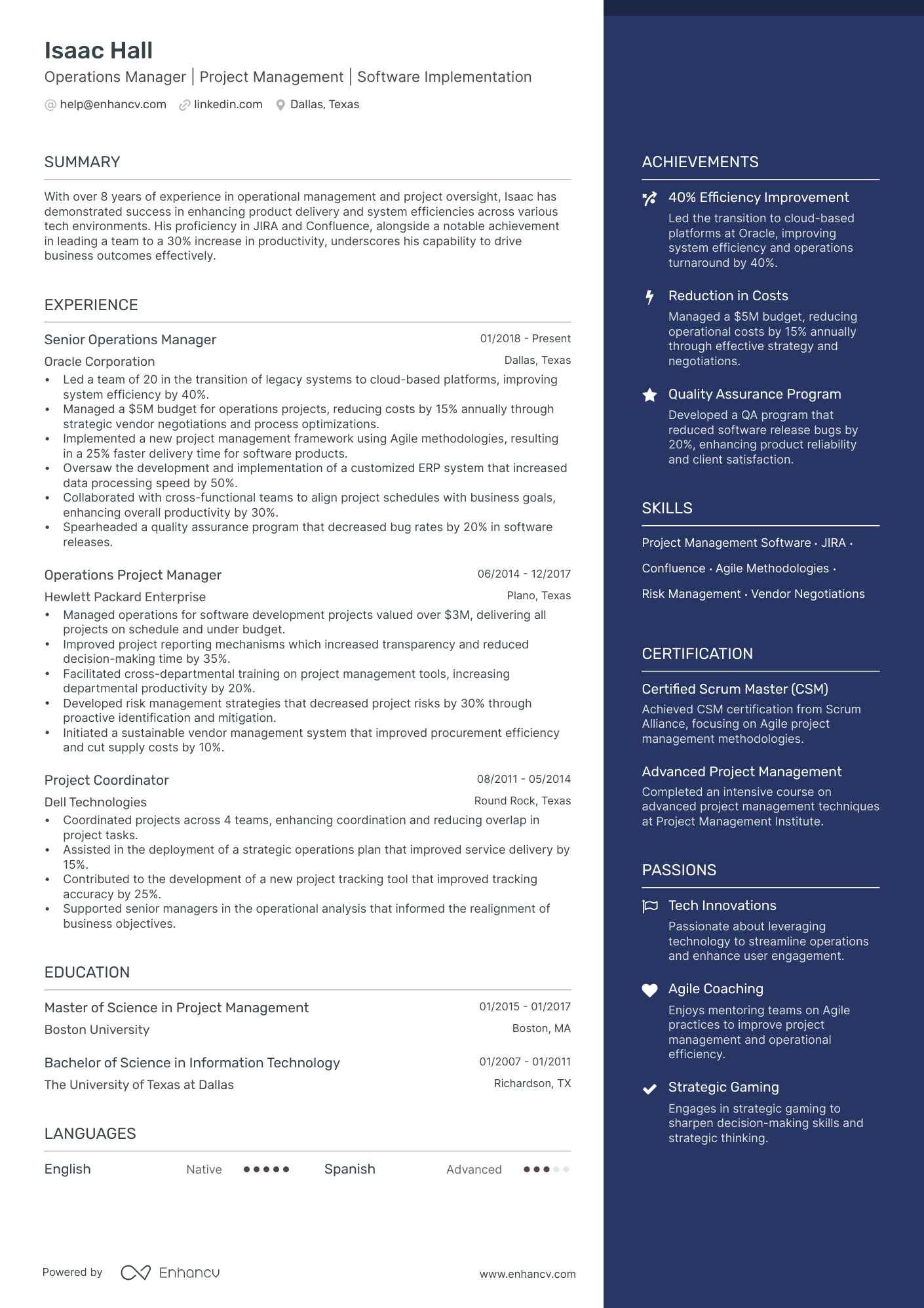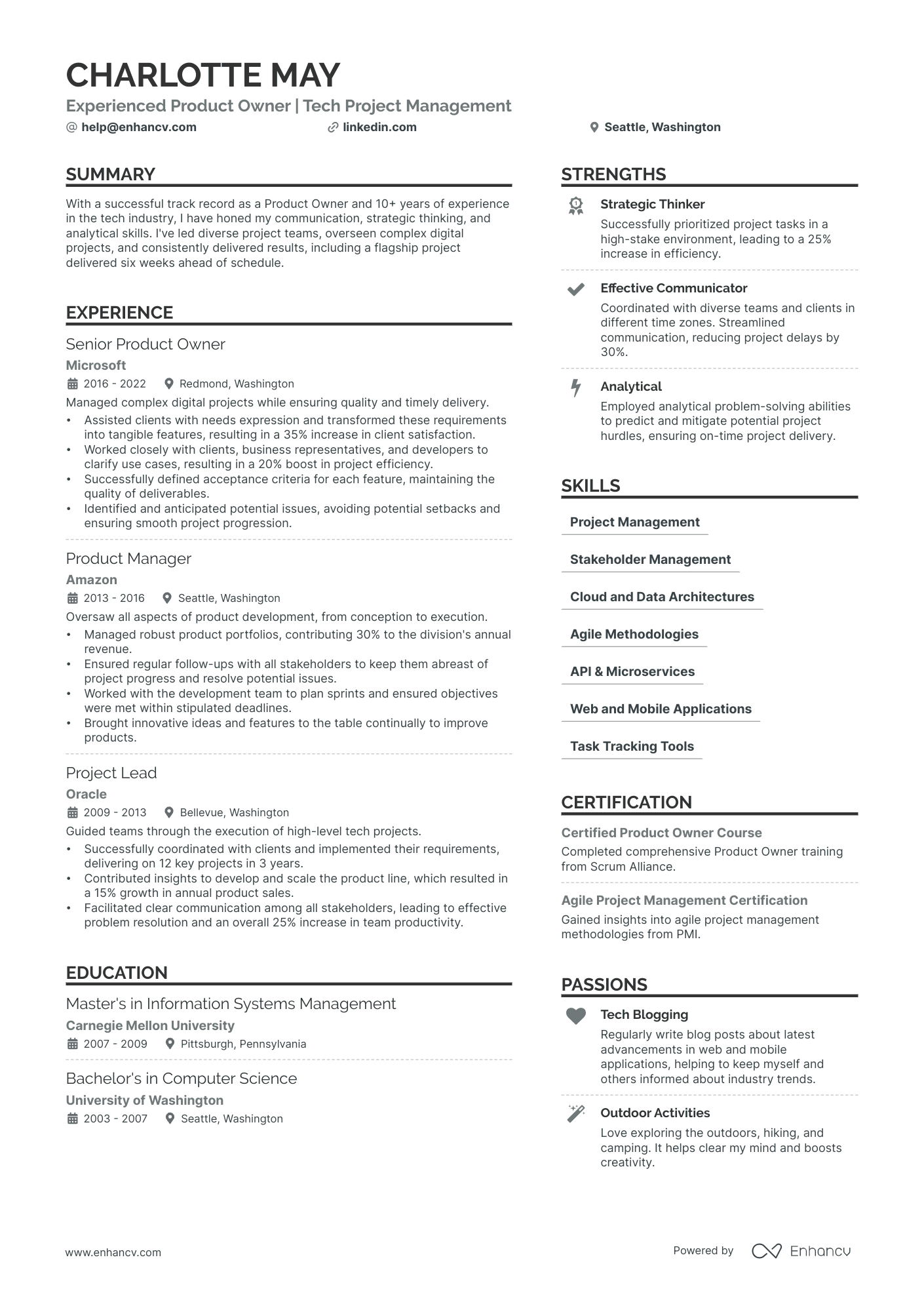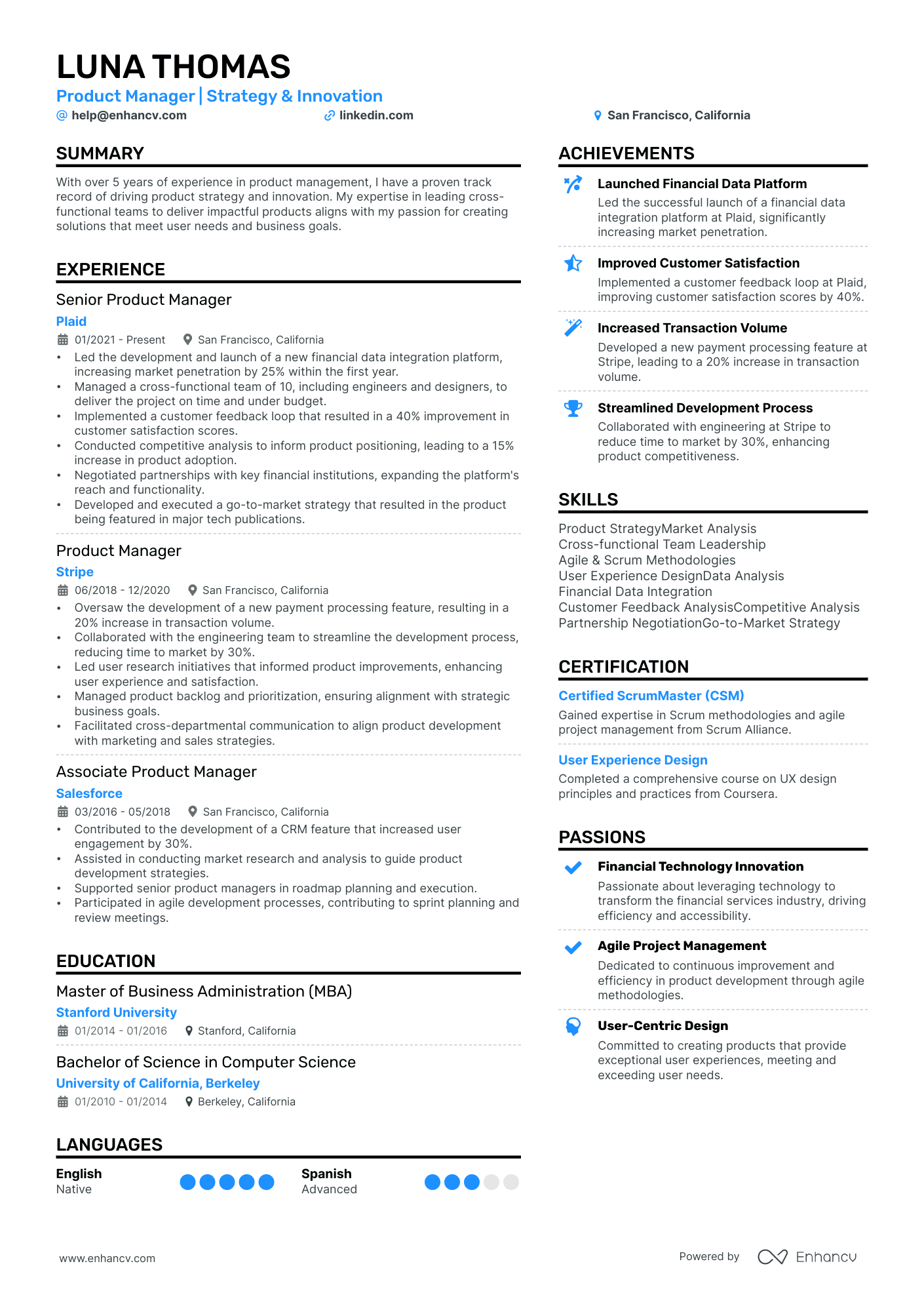You’ve spent your career building product roadmaps and presenting them to stakeholders. You’ve even studied Agile methodologies and UX design, expanding your abilities for project and design work professionally.
But now it’s time for a different kind of project: writing a resume for your next product manager job.
Whether you want to get an interview at your dream FAANG or have set your sights on a small startup, you’ll need to make sure your product manager resume is eye-catching for recruiters.
In this guide, you'll find product manager resume examples together with advice and best practices. We'll help you bring your most important accomplishments forward and choose content wisely, so there's no wasted space.
Here’s what you will learn:
- How to best demonstrate the value of your skills as a product manager
- The top hard and soft skills that companies want to see
- How to make up for lack of experience in your resume if you’re just starting out
If a product manager isn’t exactly the right position you’re looking for, here are some related resume guides from Enhancv:
- Business Development Resume
- Business Intelligence Resume
- Account Manager Resume
- Change Management Resume
- Market Research Resume
- Business Analyst Resume
- Tech Resume
- UI Designer Resume
- UX Designer Resume
- UX/UI Designer Resume
If these examples prove helpful, make sure to adapt them to your experience. Next, we'll examine the effective techniques used in product manager resumes.
Product manager resume examples
Here’s what this applicant does well in their resume:
- Leadership in product innovation and strategy: The resume highlights a consistent record of launching successful products, such as a financial data integration platform at Plaid, demonstrating the applicant's ability to lead innovation and drive product strategy effectively.
- Cross-functional team management: It showcases the ability to manage cross-functional teams, including engineers and designers, to deliver projects on time and under budget, emphasizing strong leadership and project management skills.
- Quantifiable achievements: The resume effectively quantifies achievements, like increasing market penetration by 25% and improving customer satisfaction scores by 40%, which concretely demonstrates the impact of the applicant's work.
Continue reading to discover the right format for effectively showcasing this important information about your product management experience.
How to format a product manager resume
Choosing the right resume format is crucial for showcasing your product management skills and experience effectively. You have three main options for organizing a product manager resume:
- Reverse chronological resume: Perfect for those with extensive experience in product management, this format lists your past jobs starting from the most recent and working backward.
- Functional resume: This format is excellent if you're new to product management, transitioning careers, just starting out, or have gaps in your employment history. It emphasizes your skills over your past job roles.
- Hybrid resume: Combining the strengths of both chronological and functional formats, the hybrid resume allows you to show your most relevant skills and accomplishments at the beginning, followed by a concise job history. This is really effective for underlining experiences that are directly relevant to the product manager role you are aiming for.
To catch the eye of recruiters, structure your resume into clear sections following these guidelines:
Resume design for product managers
- Opt for a modern resume template to show your innovative style as a product manager.
- Choose readable fonts like Rubik, Lato, or Times New Roman, sized between 10-12 for clarity.
- Maintain at least 1-inch margins around your resume for a tidy presentation.
- Use professional colors like gray, blue, or dark green for accents.
- Always include your name, phone number, and a professional email address.
- Insert a link to your LinkedIn profile if relevant and ensure it’s up-to-date.
- Include a photo only if the job advertisement specifically asks for one.
Align your resume with the market’s standards – Canadian resumes may have unique layout guidelines.
PDF is best for product managers' resumes because it keeps the layout consistent and is compatible with ATS.
If you are unsure about your product manager resume, use our free AI checker. It reviews 16 key points to improve it and help you get more interviews.
Is your resume good enough?
Drop your resume here or choose a file. PDF & DOCX only. Max 2MB file size.
PRO TIP
Don’t let all your hard work be for nothing! Check out these common resume mistakes and be sure to steer clear of them.
Remember to showcase the key sections of your product manager resume.
Curious about these key sections?
Let's dive in and discover them!
The top sections on a product manager resume:
- Professional summary: Important to quickly outline qualifications and what the candidate can bring to the role of product manager.
- Key skills & competencies: Vital to highlight relevant hard and soft skills, preferred methodologies and any technical proficiency required.
- Product management experience: This illustrates previous roles held, emphasizing duties and achievements that directly relate to product management.
- Educational qualifications: Though experience is crucial, noting education and certifications can showcase foundations in business, management, or technology.
- References or referee details: Having credible references from past roles or academic experiences can further establish a candidate's capability and reliability for the product manager role.
If you're struggling to fit all your experience into a one-page resume, explore best practices for two-page resumes. If your product manager resume extends beyond the optimal two-page length, it's advisable to refine the content. Focus on eliminating any information that doesn't directly contribute to illustrating your qualifications and aligning with recruiters' specific interests in a PM candidate. Highlight the skills and experiences that matter most to recruiters.
Let's get into the details.
What recruiters want to see on your resume:
- Proven experience in product management: Recruiters prioritize this as it demonstrates you have a clear understanding of what the role involves and have successfully performed in a similar capacity previously.
- Understanding of market competition: This shows your ability to evaluate the market landscape and make strategic decisions for the product.
- Technical proficiency: This is important as many products are tech-oriented and require understanding the technical aspects to effectively manage and lead a team.
- Excellent communication skills: product managers need to communicate effectively with different teams, therefore recruiters prioritize this to ensure the success of cross-functional collaboration.
- Proficiency in data analysis: This skill shows your capability to analyze user behavior, market trends, and other useful data, to make informed decisions and strategies about the product.
Aim to write an experience section that strikes the right balance between brevity and detail yet highlights your professional value.
Keep reading!
Next, we'll outline effective and ineffective practices.
How to write experience section on your product manager resume
A strong product manager's resume experience section will show measurable accomplishments and steady career growth.
Having a career trajectory that goes from startups to FAANG makes you a good candidate, but recruiters will want to see how you got there, the goals you achieved and what you did for the company.
When writing your experience section, stick to three to four bullets beneath each role and focus on specific examples that demonstrate your success. This is even more important when applying for a job as IT product manager.
- •Received product feedback from customer interviews
- •Planned out the product roadmap
- •Presented market assessments to executives
- •Collaborated with the marketing and development teams
What doesn’t work in this example:
- Bullets list general responsibilities
- No mention of achievements
This candidate’s experience section is essentially just a basic description of responsibilities for their product manager role. This doesn’t bring much value to recruiters, and it will blend in with the hundreds of other resumes they’re sorting through.
Your achievements are more valuable than your responsibilities. Hiring managers want to know that you will contribute to the company’s bottom line with your exceptional product management skills.
Let’s take a look at how to convey that in your experience section.
- •Achieved 40% product revenue growth in three months by planning and launching four new key features
- •Improved user activation rate by 200% and boosted conversions to premium plans by 60% by strategizing and implementing a new user onboarding flow
- •Conducted 500+ customer interviews for product feedback, with suggested improvements leading to a 99.6% customer satisfaction level
- •Presented market research, competitive positioning, pricing and revenue models to key stakeholders
What works in this example:
- Includes measurable data
- Specific examples show positive impact
Now the hiring manager is ready to call you for an interview!
By using real percentages and statistics to back up your claims, you will stand out from other candidates.
Quantitative data adds more trust and confidence in your resume and your abilities.
It’s also important to carefully curate what experience you show. If you have the good problem of too many achievements to choose from, include the ones that make you most qualified for your target job. Too many statistics overwhelm the reader.
For more ideas on how to create an actionable resume experience section, check out our guide How to Describe Your Resume Work Experience.
It’s worth mentioning that Enhancv provides professionally designed, ATS-friendly resume templates that can be useful.
Let’s delve further into this topic.
How to quantify impact on your resume
product managers must emphasize the quantifiable outcomes of their strategic efforts on product advancement and market strength. Consider the following tailored advice:
- Include the number of projects you have managed
- Detail the size of the teams you have led
- Specify the budget you have managed for a project
- Quantify sales or revenue growth achieved through your products
- Mention the number of products you've successfully launched
- Specify any percentage increase in product user engagement
Even without direct product management experience, these points can illustrate your capability. They show how you can significantly contribute to product advancement and market positioning.
How do I write a product manager resume with no experience
Excited about starting a career in product management but worried about your lack of work experience? Fear not—there are entry-level positions designed to welcome newcomers like you. Let us assist you in crafting a resume that highlights your untapped potential. Your unique background can bring fresh perspectives and skills crucial for product management.
Here's how to structure it:
- Educational insights: Begin by emphasizing your educational achievements, especially focusing on any courses or certifications related to product management or related fields to lay down a solid knowledge base.
- Value beyond experience: Include sections on projects, volunteer activities, or freelance work that relate to product management or demonstrate relevant skills. These experiences showcase your ability to contribute value from day one.
- Transferable skills highlight: In the experience section, accentuate transferable skills such as communication, creativity, analytical thinking, and project management. These are vital for a product manager and illustrate your readiness for the role.
- Practical engagements: Mention any internships or academic projects that involve product management tasks, even if unpaid. These experiences provide tangible evidence of your practical skills in the field.
For entry-level product managers lacking work experience, your new perspective and degree are valuable starting points. It's important to remember that personal qualities are just as essential as technical skills.
We'll show you how to effectively highlight your hard and soft skills, emphasizing your potential despite having no experience.
How to list your hard skills and soft skills on your resume
When adding skills to your product manager resume, there are a few best practices to follow.
Read the job description for your target role and tailor your skill section accordingly.
When looking at your skills section, recruiters are mainly interested in technical skills. They want to know immediately whether you have the hard skills needed for the job.
Soft skills are important for product managers to have but may require more context. For example, use your experience section to show off your communication skills by presenting to satisfied stakeholders.
Best hard skills for your product manager resume
- Product roadmaps
- Agile methodologies (Scrum and Kanban)
- Financial modeling
- Product pricing
- Create go-to-market launch plans
- User onboarding strategy
- Software engineering
- Analyzing product metrics for growth and troubleshooting
- Conducting customer interviews
- UX and UI design
- Prioritizing features based on user feedback and metrics
- Demo Skills (e.g. PowerPoint)
A common mistake in the skills section is that candidates will add every technical skill and platform they’ve ever interacted with.
Technical expertise is not usually required of PMs, but an interview may include technical questions to see how well you can communicate with engineers and developers.
You don’t want to be caught in a lie by listing coding languages on your resume and then giving a blank stare when asked a basic question about them. It’s best to include the top skills that you’re confident in.
Best soft skills for your product manager resume
- Communication skills (written and verbal)
- Presenting to key stakeholders
- Leadership
- Analytical thinking
- Problem-solving
- Time management
- Project management
- Collaboration with cross-functional teams
- Research (market and competitive)
- Risk management
- Presentational skills
For more examples on stand-out skills sections, read our Resume Skills Section That Impress guide.
Adding relevant certifications to your resume is also a strategic move to highlight your skills, crucial for any product manager seeking new opportunities.
How to list your certifications and education on your resume
A resume for a product manager isn't complete without a detailed education section and relevant certifications. The education section is vital, showcasing your foundational knowledge and specialized training in product management.
Below is an excellent example of how to effectively present your educational background on your resume.
- •Specialized Coursework: Advanced clinical practices in critical care nursing
- •Core Modules: Patient care technologies, critical care procedures, and emergency response techniques
Earning a degree in business, technology, or a related field showcases your commitment to grasping complex product management principles. Each academic accomplishment signals to employers your ability to manage significant responsibilities in product development and market strategy environments.
Below is the optimal method to display your educational background and certifications on your resume for a product management role.
Best certifications for your product manager resume
Ensuring every section of your resume is thorough is crucial, but for a product manager, a compelling summary is essential to direct recruiters' attention to the most significant aspects of your product management experience.
How to write your product manager resume summary or objective
Start your product manager resume with a strong summary to capture recruiters' interest, focusing on your product management skills and experience.
Keep your summary concise, around three sentences, to quickly showcase your qualifications and alignment with job requirements, including relevant keywords.
For product managers, a summary is more effective than an objective statement, providing a brief overview of your professional background and expertise.
Consult our guide for creating an engaging resume summary specifically designed for the product manager role.
This summary is a bad example for several reasons:
- Lacks specificity in skills and accomplishments relevant to product management.
- Missing quantifiable results to demonstrate impact.
- Uses vague language, omitting strategic responsibilities.
- Ignores critical technical and analytical product management skills.
- Lacks industry-specific knowledge or experience.
This summary stands out for multiple reasons:
- Demonstrates measurable achievements in engagement and revenue.
- Highlights data-driven decision-making skills.
- Emphasizes leadership in team guidance.
- Shows adaptability in fast-paced settings.
- Focuses on significant product improvements.
- Indicates motivation for new challenges in product management.
Additional sections for a product manager resume
Recruiters read hundreds of resumes every day, many of which are unoriginal and repetitive.
No two people or career paths are exactly alike, so why not make your resume unique?
Showing hiring managers what you’re most proud of will make you stand out from other candidates and inject a little of your personality into your resume.
PRO TIP
Recruiters and hiring managers are far more likely to remember you if you seem like a genuine person and not a robot. Do this by including your passions, sharing your favorite books, or even the words you live by.
For product manager roles, emphasizing both technical and soft skills is vital. Include these sections in your resume:
- Courses: Demonstrates continuous learning in product management and related fields.
- Volunteer work: Showcases leadership and teamwork skills developed in non-work settings.
- Awards: Recognizes achievements and excellence in product management or related areas.
- Passions: Mention your personal hobbies and interests outside the office, like reading or hiking. They underscore your creativity and enthusiasm for product management, matching well with a company’s culture.
How to put a Projects section on a network engineer resume
Typically, hiring managers and executives like to see direct examples of your work. They need to determine if your approach to product management and your strategic capabilities are a good fit for their ongoing projects.
Here’s an example:
- •Led a major initiative to develop and launch a suite of digital products, increasing market share by 40% within a highly competitive sector.
- •Directed cross-functional teams in a user-centered design process, ensuring product features aligned with customer needs and market trends.
- •Implemented agile project management practices to streamline product development cycles, resulting in a 30% faster time-to-market for new features.
Key takeaways
- Craft a strong resume summary that captures recruiters' attention by concisely presenting your product management skills, experience, and key accomplishments.
- Use quantitative data to back up your claims about your accomplishments. Did you improve revenue with a new product launch? Use real numbers to show your impact.
- Include a mix of soft and hard skills on your resume, and mirror the same keywords and phrases that are listed in the job description.
- To write an entry-level product manager resume, highlight your side projects, education, and skills to prove your passion and potential.
This guide shows the basics of writing a modern and effective product manager resume. We hope you find our techniques useful and will use them wisely when creating your resume. Let us know when you get the job you love!
Product Manager resume examples
Explore additional product manager resume samples and guides and see what works for your level of experience or role.
By Experience
Product Manager Intern
Entry-Level Product Manager
Entry level resumes can be intimidating for any industry. How do you fill a product manager resume with little to product manager experience?
Here are a few tips to follow when writing an entry-level product manager resume:
- Pull experience from places other than work history. If you’re a fresh graduate, odds are you don’t have much work experience. If you’ve done internships, great. You can also include projects, training, and relevant courses.
- Keep your contact info professional. Now that you’re entering the workforce, you’ll want to shed that “.edu” email address and choose a professional name. Stick to some version of your real name - your initials, first name, and last initial, first initial and last name, etc.
Senior Product Manager
Senior Product Managers are not your typical executives, and specific experience and even the way you frame your experience in a Senior Product Manager resume can go a long way.
Below are some tips to increase your chances of a successful application for a Senior Product Manager job:
- Frame your experience as ROI-driven. Senior Product Managers are here to make an impact. If you attach your work to tangible results, you’ll gain an extreme advantage over candidates that list all possible clichés on their resumes and hope for the best.
Remember, a targeted resume approach works best when combined with business outcomes for a particular industry or product.
- Double down on strategic skills. Things like “product strategy”, “global technical debt”, or “milestone deliverables” are no empty boast to senior product managers. It’s what they are paid to do.
Junior Product Manager
Director of Product Management
VP of Product Management
By Role
Google Product Manager
Amazon Product Manager
Agile Product Manager
Depending on your interests and experience, you might want to focus on a specific nice. Fortunately, there’s always a demand for experts in systems like Agile methodologies.
Read below for a few tips on writing an Agile product manager resume:
- It’s okay if there’s some variety in your job titles. Even if you’re experienced in Agile, it may not be the focus of every role you’ve ever had. If that’s the case, tailor the experience to fit job-specific skills.
- Include outside skills like languages. This resume example shows the addition of a language section. If you speak more than one language, this can be a big advantage. Especially if you will be collaborating with international partners and stakeholders. Do a bit of research on your target company and see what unexpected skills might be useful.
AI Product Manager
Api Product Manager
Assistant Product Manager
Associate Product Manager
Paradoxically, recruiters can be very picky when it comes to entry-level product managers jobs. The reason is simple: they realize that people in these positions will grow into future company leaders.
Below are some tips to give yourself some competitive edge when applying for Associate Product Manager jobs:
- Compensate lack of experience with skills. Recruiters are always looking for hidden gems in entry-level candidates. But the key word here is relevance.
If you’re applying for a data-driven company, make sure to mention your data mining or data modeling skills to get an edge. If you’re applying for a less technical company, show soft skills in a real-world context, e.g. “led university presentations class for a year” in your skills section.
- Feature side projects relevant to the job. Frankly, anything can be labeled as a “project” these days, and that’s why it becomes so important to mention only projects relevant to the job application.
Also, make sure to include two key components when describing your projects to stand out: managerial qualities and tangible impact.
B2B Product Manager
Creative Product Manager
Data Product Manager
Digital Product Manager
Ecommerce Product Manager
Growth Product Manager
Healthcare Product Manager
IT Product Manager
An IT product manager has most of the same responsibilities as a PM, but IT program managers work more closely with technical tasks.
If you’re going down the path of an IT product manager, here are a few things to keep in mind:
- Don’t get too hung up on statistics. This may seem in opposition to everything else in this guide, but it is possible to include too many numbers and figures. You always want to give specific examples, but too many stats make the reader lose focus. Aim to strike a balance between the two.
- Tailor your skills to your target job. The candidate in this resume example cites communications technology in the summary as their industry. Sometimes it pays to pick a niche within a niche. A communications technology company will pick your resume out of the sea of generic IT product manager resumes.
Principal Product Manager
SaaS Product Manager
Software Product Manager
In a way, the Product manager position emerged from the software engineering field. Hence, why software engineering trends tend to affect global product management trends.
The following tips will help you more successfully apply for Product Manager jobs in the software industry:
- Experience with non-technical software development practices is paramount. Agile, Scrum, Kanban, DevOps, extreme programming. Entire companies and teams are built and rebuilt following specific development practices.
Make sure to feature relevant Agile experience and skills, or you risk getting sidetracked too early in the process.
- Prioritize the technical background that impacts the product. A big chunk of great software product managers came from software backgrounds, so make sure to feature your technical skills and how they affected the product's performance all throughout your resume.
Don’t simply list technical skills. Demonstrate how they helped you improve the product and its performance, e.g. “reduced technical debt with…”, “improved customer satisfaction after…” and so on. Follow the “skill-action-results” pattern.
Tech Product Manager
Technical Product Manager
There is some overlap with technical product managers and software product managers. If you have a strong engineer or developer background and are looking to become a PM, this might be a good place to start.
Here are a few things to note when writing a technical product manager resume:
- Lean into your tech background. If you’re an expert programmer and have lent a hand in the launch of any apps, include that in your skills and experience. This can work in your favor if you’re still transitioning into product management.
- Don’t forget soft skills. It can be easy to leave out soft skills when you’re putting so much effort into getting the technical skills right. As a TPM, you will be exercising some soft skills and companies will want to see how. Take the opportunity to show off your communication or problem-solving skills.
Chief Product Officer
FAANG Product Manager
If you have built a career coming up through FAANGs, there are plenty of reasons to want to stay there. You can learn a lot in major tech companies and each one has something different to offer.
Here are a few things to keep in mind when writing your FAANG resume:
- Think about what makes you unique and consider finding a place for it. Recruiters for FAANGs especially see hundreds of resumes a day. Consider what would make a major company want to hire you over everyone else. Have you worked on a major project? Had something published on the subject? Traveled the world for work?
- Don’t forget the basics. FAANGs are major companies for a reason. There is a lot of structure built on a strong foundation. Choose the operating systems and technical skills that you’re confident in. FAANGs want skilled employees who will benefit the company.
